#plus they put so little emphasis/meaning/significance into his death
Text
I’ve been watching Titans. What have they done to my boy.
#kelseethe#all the biting side remarks about how annoying and not personable Jason is and how he’s so shallow#god. Kory saying that Jason never grew or learned to be part of their family#if Dick or anybody else put like. 22% of the amount of faith and care Dick put into Rachel in ss1-2 into Jason. he’d be like. fine lol.#every time somebody says he was just too much trouble I smh#it really seemed like a cycle of other people keeping things from him/not trusting him#then everyone blowing his mistakes way out of proportion#and when someone else fucks up or screws him over and he gets upset/leaves#nobody cares to find him again and make things right the way they did with anyone else. like everyone just forgets#like. After Rose met up with the titans and made amends she could’ve dropped by with Jason and at least tried to talk things through#it really didn’t take much for Jason to warm up to her so quickly#plus they put so little emphasis/meaning/significance into his death#that everything that happened to him. everything everyone did/said to him is far more depressing than the fact that he died#pls they also made him red hood like 0.04 seconds after he died and came back#I’m currently about half way through ss3 and like. they’re massacring him me thinks
9 notes
·
View notes
Text
So, after surviving a crappy year, I decided my reward would be yet another rewatch of Desire Catcher. I know this fandom is kinda tiny, but I always enjoy reading other people’s random thoughts and observations so I thought I’d throw mine out there too.
There are, of course, a bunch of different crime-related plot lines in the show, but this is basically going to just be me yelling about Luo Fei and Lu Fengping, seeing as I remain obsessed with them. I’m always up for discussing these two nerds in love, so feel free to tag me or message me (*waves to @thinkonce-acttwice!*). I’m at about the halfway point now, so I’ll post again once I finish the rest of the episodes.
Overall, I really like Desire Catcher - the various bits of plot don’t quite come together in the end, but for me it’s more about the relationships and themes of revenge, regret, and forgiveness. So, lots of angst, which I’m always a big fan of, and which I suppose says something about me…
Luo Fei! Light of my life, the silent, broody, lone wolf cop - ACAB, of course, but he’s firmly in sad (not-so-little) man territory, which is catnip to me. Plus he has a collection of black leather jackets - need I say more?
Lu Fengping! Other light of my life - Luo Fei’s future boyfriend, I mean consulting hypnotist, the more outgoing, “quirky” one. He’s always in light colors, dashing around with a lollipop in his mouth (I know there's a cute connection with his mom about them, but that aside, “oral fixation vibes” anyone?), teasing everyone around him - contrasted with Luo Fei’s dark colors, grim expressions, and workaholic nature. Though it’s interesting that as the show goes on it becomes clear that some of Lu Fengping’s affectations are really a mask he puts on to hide his pain (yay, angst!).
Their first real meeting happens over a meal; it’s dark, it’s raining, there’s thunder in the distance - foreboding and romantic all at once. There’s definitely a teasing/flirty vibe there, though Luo Fei seems wary of Lu Fengping - in fairness, Lu Fengping is sort of using him for info on his mom’s murder case, though it gets a lot more complicated than that as time goes on.
While there’s a lot of emphasis on their differences (e.g., dark vs. light), it’s interesting to note how similar Luo Fei and Lu Fengping actually are, even if they don’t see it yet. For example, Luo Fei has trance-like visions as he imagines what happened at a crime scene, much like how Lu Fengping sort of walks around in someone’s mind/memories when he’s hypnotizing them.
So I know this is mainly about the boyfriends, but I want to say that I love all the other members of the investigation team too, especially Liang Yin - definitely not a fan of the “woman suffers for man pain” thing, but they do give her a couple of moments of reclaiming her agency, which I liked.
Luo Fei and Lu Fengping kind of dance around the whole I-know-you-know-more-about-my-mom’s-death thing for most of the first half of the show, at least until it all comes out when Lu Fengping hypnotizes Luo Fei (and WTF suggesting that Zhang Yu - you were supposed to be the show’s moral compass!). Like I get that by this point they’re becoming closer, feeling more open to each other, but still - you’re just rooting around in his brain without permission, my guy. Yikes.
I’m a big fan of parallels and I think we get a pretty significant one here between Luo Fei/Lu Fengping and the story of the relationship between Xiao Xifeng and Tu Liansheng. While you could certainly read it as just two longtime friends, the flashback scenes of them raising the abandoned kid together certainly give off a “couple-y” vibe. Given that the show can’t come right out and say anyone is actually gay/queer, to me it’s a way of floating the idea out there and letting people draw their own conclusions.
Speaking of reading into things, I had to go there and look up the various books shown strewn around Lu Fengping’s apartment. There were two romance novels (“Crimes of the Heart” by Allie Harrison and “Yesterday’s Bride” by Charlotte Walker), another female-centric novel (“Things to Make and Mend” by Ruth Thomas), a financial memoir (“The Age of Turbulence” by Alan Greenspan), and, my personal fav, some gay French shit (“Remembrance of Things Past” by Marcel Proust). Kind of an odd combo of things, but there are some bits that do seem to fit with the themes of the show - lots of misunderstandings, mistakes, not wanting to lose the people close to you. The Greenspan book is more of an outlier, but it does have the theme of “the invisible hand” - it’s mainly an economic term, but you could extrapolate it more generally to people acting on instinct, rather than in a calculated way, sort of like how Lu Fengping’s mom acts to save Liang Yin, setting off a chain of events (kind of a stretch, though). And I guess I don’t have to say much about the Proust - feels like the kind of book you’d use as shorthand for “some gay stuff is happening here, folks.” Plus, the book deals with memory and how people can perceive the same thing in totally different ways, which seems relevant to the mom’s death story line.
Getting back to the gay stuff, there were definitely a few things that made me 👀. First, when Lu Fengping says “no problem” a little too forcefully when Luo Fei tells him to wait outside while he changes - like, “don’t worry, bro, I totally don’t want to see you naked, nope, not at all, hahaha” (combine that with his comment “You don’t like men? Haha, neither do I!” in a later episode to Liang Yin - feels like he’s protesting a bit much). Second, they’re always kind of flirty with each other, even if it’s subtle. There just seems to be a bit of subtext in a line like “You’re in a pretty unique situation” when Luo Fei sees Lu Fengping facedown on the floor at one point, not to mention the looks they give each other when Lu Fengping ends up stumbling to his knees in front of Luo Fei (and you can’t tell me that that was a totally accidental push on the part of Lu Fengping’s mentor - he totally ships them too, IMHO). Third, you can’t overlook the jealousy that rears its head when Luo Fei sees Lu Fengping getting flirty with the (eventually evil) nurse, or when he thinks Lu Fengping brought a girl home to his apartment. Fourth, there are several bits of convo that play around with subtext and seem aimed at the audience with a wink and a nudge. For example, there’s the bit in the car where Lu Fengping brings up marriage (sure, it’s in reference to a different character, but Luo Fei has a justifiable WTF reaction), asks if Luo Fei has a girlfriend, and basically tries to set him up with a female client of his (who, it should be noted, sounds suspiciously like Lu Fengping himself - “very outgoing; your personalities complement each other very well”) in the span of about 10 seconds. Luo Fei gives him his best “bitch, please” look and ditches him - I’m with you on this one, boo. Then there’s a weird bit of dialogue when they’re searching a suspect’s very neat and orderly apartment - Lu Fengping says “A man living by himself can keep a place like this clean. He wouldn’t be that thing…” - long pause, pointed look at Luo Fei - “OCD or something like that?” The audience knows at this point that Luo Fei’s apartment is just as well-kept, and there seems to be an implication that Lu Fengping is actually referring to the stereotype of gay men being very neat. And how could I not mention the fight scene in the gym - beyond the groping, grunting, and full-body contact of their grappling session, the looks they give each other afterward, the small smiles when the other isn’t looking, Lu Fengping thanking Luo Fei for bringing flowers to his mom’s grave - it’s a lot.
DATE NIGHT! (Sorry, I just get really excited about this part.) So here we have Mr. Uptight, known-to-not-drink-with-his co-workers-ever Luo Fei agreeing to go out with Lu Fengping after work and proceeding to get shitfaced (or does he…? He seems suspiciously sober after Lu Fengping puts him to bed and leaves the room). It’s tropey (drunken piggyback ride), it’s sweet (Lu Fengping tearing up when he sees he’s been added to the work group chat), it’s typical man shit (drinking instead of talking about feelings). They’re both just so tender and raw right under the surface and it makes me slightly feral, ngl. Also, the bit with Luo Fei’s parents there in the morning - I love how Lu Fengping immediately charms them and how they rush off like, “oops, sorry son, didn’t realize you brought a 'friend' home - we didn’t mean to interrupt!” And, of course, Liang Yin’s knowing smile when she sees them show up to work together the next morning; at this point in the show I’m not sure there’s any character who doesn’t ship it…
On a sad note, poor Xiao Liu - all he wanted was for his boss Luo Fei to be proud of him. Sure, he fucked up a couple of times, but he still didn’t deserve to get stabbed to death like that, nor just become another brick in the wall of Luo Fei’s “man pain.” (Also, WTF Luo Fei - do not throw papers at your subordinates - not cool, bro.) I’m probably reading too much into things, but there was kind of an undercurrent of Xiao Liu having a little bit of a crush on Luo Fei - he seemed so sad that Luo Fei had drinks with Lu Fengping almost immediately after meeting him, while Xiao Liu had been waiting to do that with Luo Fei for years. Interesting to note too that Xiao Liu also favored lighter-colored clothing, much like Lu Fengping (more of the light vs. dark trope).
Alright, well, this got away from me a bit… Looking forward to the second half of DC and all that delicious angst. 🖤
22 notes
·
View notes
Text
How Black Clover Gets Lady Characters Right
*Spoilers for most of the Black Clover anime (mostly character related stuff, not much in the way of major plot stuff)*
Black Clover is right up there with Gintama in terms of shows that reward viewers for sticking with them through some mediocre early episodes and arcs. When Black Clover began airing, I was excited. Manga readers had been hyping the series up, and it sounded like the next big shounen fighting anime that would take anime fandom by storm. Then I started watching it, and I was immensely disappointed. I found Asta’s constant screaming almost unbearable (to the point that I started muting the tv when it looked like he was about to open his mouth). The early episodes were totally predictable and cliche. The animation was, at times, embarrassingly bad. But I stuck with it because there were a few elements that kept me interested. One was the absolute bangers of opening and ending themes (at one point the thought crossed my mind that they were entirely too good for this show). Another was Yuno, whom I liked from the start. Then there’s the fact that Asta’s magic, or lack of magic, was the one element I didn’t predict a mile away. I honestly expected him to awaken to some super powerful magic early on. Almost 200 episodes later, he is still magic-free. I really did not see that coming. Still yet, I came close to dropping the series several times during those first thirteen episodes or so.
Somewhere around the time they went to the undersea village (I don’t remember the name of the arc), I began to notice that I was actually looking forward to each new episode. It was a gradual change from being at the bottom of my watch list to being near the top. So gradual it took me a while to realize it. The show still had some problems, sure, but it stopped being predictable. Asta talked more and screamed less. More interesting characters were introduced. The fight scenes were exciting. By the time this arc was over, Black Clover had become a favorite. So, if you tried the series and found it boring and annoying, consider giving it another shot. Like I said, it rewards you for sticking with it.
One of the best things about Black Clover, for me, is how it treats its female characters, especially when compared to other popular shounen fighting anime. It is by no means perfect, and I’ll talk about the show’s minor failings in regards to its ladies a little further down. But overall, it does a phenomenal job.
The first thing that struck me about Black Clover’s women is just how varied they are. There’s a surprising range in their appearances, personalities, and skills. And there are lots of them. Far more than a lot of other shounen fighting anime allow. There are five women in the main squad, the Black Bulls, alone. And we see that each squad has several women as well. Then there’s the all-women squad the Blue Roses. This extends to the villains, as well as the non-combatant supporting cast as well.
Speaking of skills, the women of Black Clover are unusually powerful. The two male leads, Asta and Yuno, eventually get “power-ups”, some kind of new form or transformation or whatever. This is super common in shounen fighting anime. What’s not so common, however, is the female lead getting her own cool power-up/transformation. This is what happens for Noelle, and it was such a great surprise. A little side note here: I’ve been watching the series on a streaming site that allows comments, and I was so amazed by the comments on the episode in which Noelle gets her power-up. The (mostly male, judging by their names) commenters were genuinely happy for her! They were proud of her for getting stronger and cheering her on! I didn’t spot a single comment about her looks or how great of a waifu she is (at the time anyway).
But it wasn’t just Noelle that got stronger. Another Black Bulls member, Vanessa, got an interesting power-up of her own, in the form a cat familiar that basically makes her and her teammates completely impervious to harm for as long as her mana holds out (which has saved their lives countless times). Another lady, Grey, has recently (in the anime) demonstrated some shockingly powerful magic that none of her teammates, or even she herself, realized she was capable of. Then there’s Charmy, who was already quite powerful but gained her own powered up transformation that made her strong enough to defeat an elf-possessed Magic Knight captain. If anything, the ladies have received MORE power-ups than the men.
And while we’re talking about powerful women, I have to talk about Mereoleona. If you’ve watched the show, you know exactly what I mean. If you haven’t, just imagine a character who can curb-stomp a powerful villain who is on a higher level than villains that the main characters were struggling to team up against just a few episodes before, who can then take on a whole group of these powered up villains and remain standing, even after losing consciousness, because they’re just that badass. Now imagine that character is a woman. And she’s so terrifying that one of the elf-possessed enemies (her comrades who had their bodies taken over by elves) remarks that his body froze up because, even though he’s controlling it, the BODY ITSELF was afraid of her. Mereoleona is an absolute beast, the kind of character that is almost always male in these types of shows. And the best part? The icing on this badass cake? The only person who was stronger than her, who could defeat her one-on-one, was ANOTHER WOMAN. Noelle’s mother. And a huge part of Noelle’s motivation as a character is becoming strong like her mother.
On the subject of Noelle’s motivation, I really appreciate that it has nothing to do with her crush on Asta. Sure, she likes him, but it’s not a motivating factor in her life and it’s not even really that important to her story arc. Her arc has always been about HER, about becoming stronger, living up to her powerful family’s expectations, discovering the truth about her mother’s death and then about avenging her, about becoming more empathetic to the common people despite being royalty. Noelle’s story is ABOUT HER. And it’s really sad that this is something remarkable, but we’ve all seen the “heroines” with no real arcs of their own, or worse, their arcs revolve almost entirely around their love for a male character (Sakura from Naruto is the most obvious example here but anyone who watches a lot of shounen can no doubt name many more). And Noelle isn’t an exception in Black Clover. Almost all of the women have interesting back stories and character arcs that have little to do with men (or if men are involved, they’re in supporting roles to these stories and very rarely the main subject).
An exception to this is possibly Charlotte, who is in love with Yami and this plays a big role in her story. However, even this is framed in a way that puts the emphasis on her own growth. It’s really about her learning to be honest with her feelings and getting over her own awkwardness around Yami. A big moment for her is when she admits to her squad that she’s in love with Yami, and they’re all eager and excited to help and support her, like the wonderful ladies they are.
Now, as I said before, Black Clover’s depictions of women are not perfect. There are a few issues I consider minor that I need to address. The first is the tendency the show has of making almost all the ladies be in love with someone. A large portion of the women are sporting crushes, though some of them are quite subtle or mainly used for comic relief, it’s still a little annoying that so many of them are in love. Of course, many of the male characters are in love with someone too (including the protagonist, Asta) and there are several female characters who are totally disinterested in romance, so I can overlook this. Another small issue is that, even though there’s more variety than usual in the body types (one female character is fat and another, Charmy, often gets quite pudgy for extended periods of time, plus a few ladies have more muscular builds), a significant portion of them have very large breasts, including two teenage characters (Noelle and Mimosa). It feels a little unnecessary, to be honest. Though to be fair, it’s rare that any of these characters are used for fan service and the camera never really seems to linger on their bodies. Most of them dress fairly modestly and among those who don’t, the more sexy clothes fit their characters and make sense for their personalities.
The last minor issue I have is that we often get the “designated girl fights”. If there’s a female villain, it’s likely that a female hero will be the one to fight her. This isn’t a rule set in stone, because there are plenty of male/female battles, but it happens enough to be very noticeable. Of course, these lady villains are demonstrated to be just as powerful and dangerous as the villainous men, but it’s still mildly irritating.
Those little nitpicks aside, Black Clover is still a shining example of a shounen fighting anime getting its ladies right. The women in the series are well-written, interesting characters with compelling stories. They’re powerful, have wildly varying personalities and motivations, and never feel like window dressing. They’re not just there to be pretty romantic interests. The show does all this very well, and I think it deserves a lot of praise and credit for it.
22 notes
·
View notes
Text
Okay so y'all are sleeping on the After Buzz interview!!! There's SO MUCH Klance goodness to unpack here, it's full meta worthy.
undefined
youtube
Okay, so I'm sure by now everyone who regularly views the Klance tag has seen a short 20-30 second video clip from this interview going around. We're all pretty hyped about it (as we should be!)
For those who haven't seen that clip because they live under a rock: it's basically a 45 minute interview all about The Fued episode.
Here's the thing though: that 20-30 second video clip does NOT even CLOSE to do justice to the significance of Klance hinted at in this interview!! That clip isn't even the best part, imo! I highly recommend, before you even scroll down to read this meta, that you click on that video and watch from about 34:50 to about 37:20. That's the clip I'm gonna write about.
Watched it? Okay. Good.
Now listen up.
Somebody was in the Klance tag earlier tryna get people down by saying the interviewer was the one who brought up Klance, but if you watch the video clip I reccomend above, that's not true at all.
The interviewer was asking in general about how they decided who would pick who at the end of the episode. Lauren is the one who brought up Keith and Lance and their dynamic, pretty much out of the blue.
The interviewer asked how they decided who was gonna pick who, and they're talking about who wrote the episode, giving Tim credit, etc.
Lauren started saying Bob was trying to get the better of the team, and having them all choose someone besides themselves and having everyone get chosen, and show they all respect each other, was the only way to beat Bob.
But JDS had a different view.
JDS: "I think Bob was just trying to help them realize it. I don't think he had it out for them, I think he was--his endgame was, like, I want these guys to work."
I know JDS was trying to sound like he was referencing the entire team here - but honestly? I don't think he was.
I say that because, when I first watched this episode as a Klance shipper, this was the exact thought I had regarding Klance. I flipped because I was thinking, "Wowza, Bob's really out here tryna bring Keith and Lance together, huh. Number one Klancer right there, ol' Bob." I've always thought that Bob was low key trying to play matchmaker for Klance and this kinda sort of confirms that in a way, I think.
JDS: "We were like 'how's this gonna happen?' then we read it and we were like '...oh that's pretty smart, yeah.'"
LM: "That is a good way for that to happen."
JDS: "It all worked out, yeah."
I don't understand how this relates to the team as a whole.
I don't understand how this relates to the team platonically choosing each other.
They all like and respect each other. We already know this. What does JDS mean by "how its gonna happen"? How is what going to happen?
Good way for what to happen, LM?
Keep in mind, Bob is essentially an all-knowing deity. If Keith and Lance have romantic feelings for each other, he for sure knows, and was trying to help them realize it just like JDS said.
After this, the interviewer continues on talking about Keith and Lance dynamic and how theres always gonna be that little bit of antagonism between them even though they're mostly getting along now. The interviewer even brings up the "dont miss" snippet scene that pretty much everyone but Klancers brushed off in season 7.
And if you listen while the interviewer is talking about Keith and Lance and their dynamic, LM is kind of saying "yeah" in the background in a weird way, like she kind of sees, the same way I do, that the interviewer is thinking along a line of Klance.
It sounds like she maybe doesn't want to talk about it? It's hard to explain, just listen to it.
And LM kinda awkardly says "aww" at one point while the interviewer is talking about Keith and Lance dynamic. Like I'm sorry but..why aww? And why so awkwardly?
I think LM's mind is thinking in a way geared toward Klance/not spoiling Klance in these last few moments of the interview and she's trying to placate. Again, it's hard to explain, just listen for yourself.
The same person in the Klance tag earlier who was tryna get people down pointed out that, after this, JDS compares Keith and Lance to a relationship he has with a buddy of his. Debbie downer said JDS thinks of Keith and Lance as friends.
I dont think so.
I think they say little things like this to kind of hint at Klance without straight up spoiling Klance. They throw in comments like that to throw water on the fire, so to speak, to keep people from catching on.
(Also: he's not wrong at all. At this point in the show Keith and Lance ARE buddies. It's slow burn. They aren't romantic yet - but they will be.)
But also...RIGHT after JDS makes the buddy comparison is when the moment happens of LM talking, the popular 20-30 second clip that's been going around tumblr.
This is the part I'm sure you've all seen. Lauren says that Lance is maturing, moving on, and opening up by calling Keith the future. She also puts emphasis on Keith's name. "I think KEITH is the future."
And after this is yet another moment that negative peeps are tryna bring KICKers down with; Lauren says Keith is so perturbed by the whole game show thing that he doesn't put much thought into who he chose.
But...that doesnt quite add up.
Earlier in the interview, they were talking about how Keith is just so calm through the whole thing.
LM and JDS said it's because they couldn't really get a hold of Steven Yeun to revoice the lines in a more concerned tone. They make a joke about how he's not exactly easy to get ahold of (lmfao yeah we've noticed.)
Then JDS points out that it really works out, actually, that Keith is so calm, because after flying magical mechanical space lions to form a giant magical mechanical space man, there's likely very little that could perturb Keith at this point, so his meh attitude toward the game show makes sense.
That doesn't add up with him being "so perturbed" by the game show thing that he just chooses at random.
Either he's calm and collected during the game show or he's not. It can't be both ways.
So did Keith choose Lance with a calm and clear mind, or was he shaken and choosing at random? They were very inconsistent with this.
But imo? Keith isn't one to get very riled up or perturbed by things like this. Keith also isn't one to make such an important life or death decision of who should be free to leave without putting any thought into it. That doesn't match his character at all.
LM and JDS did something they often do here, which is the good cop bad cop routine.
One of them hints at Klance, then the other pulls back and tries to make it seem less romantic. Then the one who tried to make it seem less romantic hints at Klance themselves, and the one who originally hinted at Klance tries to ease it back a little.
They do this constantly when discussing Keith and Lance in any way. It's like a rhythm they've got going to stoke the flames and then splash a little water in; not starting a wildfire, but not putting it out completely.
Another thing I noticed: they said earlier on in the video that, originally, the game show was meant to be the final episode before they got back to earth.
Originally, the stakes for the game show were supposed to be "win and you basically get wormholed back to your solar system."
They decided to switch the episode order around because it didn't feel right to have them get back to earth right on the heels of a silly game show; it made the stakes seem like they were less serious, and they didn't want that (makes perfect sense! Good call!)
One note of specific pessimism for Klancers after season seven was that we got that one he's like, the future moment and then Lance turns right around and is angry and snapping at Keith in the episode where they were going space mad.
This made a lot of Klancers lose hope because they felt like any potential was fizzled out when that one moment early on in the season was almost all the Klance we got (I personally think there were more Klance moments than just the Fued in season seven, and I even think Lance snapping at Keith about running away was a low key Klance moment, but that's another meta for another time.)
But...apparently...the space mad episode was originally meant to come BEFORE the Fued.
Y'all know what that means?
It means that, originally...Lance was going to snap at Keith about running away...and then he was going to call Keith the future later on.
This makes a hell of a lot more sense in the terms of Klance being a slow burn. It was the change of episode order that threw us.
Also notice that...they didn't specifically talk about any other characters or the relationship between any othercharacters. They JUST talked about Lance and Keith.
The interviewer asked in general how they decided who was going to choose who...and the showrunners just straight up spent three minutes talking about Keith and Lance without a single mention of the other three paladins.
The interviewer didn't bring up Klance. Lauren brought up Klance. The interviewer saw the opportunity and started digging a little, AFTER Lauren brought it up.
I just...
You guys.
You guys.
All of this, plus the fact that the Garfle Warfle Snick logo is an exact replica of the irl Dating Game logo, plus the fact that Josh Keaton said this episode contains "a lot of foreshadowing," plus the way Lance looked so kind and soft when he called Keith the future, plus the confused looks Pidge and Hunk had when Lance and Keith chose each other, like they sense this was more than a bro moment?
Guys. Come on.
KICK.
2K notes
·
View notes
Text
Avengers: Endgame spoilers under the cut.
I’ll start this by saying that the movie is about a 8.5 or 9 out of 10 for me, personally, and only one thing really hit it down from being a 10/10. I got in to Marvel about nine or ten years ago, and the first Avengers movie really lured me in for life. I’ve met so many friends through these characters. These characters all mean so much to me because the early parts of this decade were probably my hardest (I hope) in dealing with depression and anxiety, and watching and reading and writing through these various characters’ struggles and victories made my own struggles more bearable. And while I know Marvel movies aren’t ending, for the majority of the characters I’ve come to know and love, their stories on film have come to an end. It’s difficult to not be emotional over it or feel passionate one way or another in how their stories have come to a close. Mostly, I’m just really grateful that someone convinced me to watch Iron Man all those years ago, because I think my life and the people I know and care about would all be very, very different.
With all that being said, here are my not-very-sorted thoughts after two viewings of the film.
What I liked:
That cold open. Man. Chilling.
Nebula and Tony playing that little game in the ship. It showcased really well Tony’s parental aspects and also something Nebula desperately needed (no manipulations, no tricks, just bonding time). I wish we got to see more of those two.
Movie luring you into a false sense of security with Tony and Steve seemingly making amends right after his rescue but then Tony has that mental breakdown and lashes out at Steve. That was raw and painful and so, so good. A quality scene tbh.
Steve leading a survivor’s therapy group. Really trying to live on in Sam’s spirit, I feel.
Steve offering to cook for Natasha.
Scott Lang arriving at the New Avengers compound.
The small, human interactions with Natasha. The scene where she, Tony, and Bruce are lounging around brainstorming and she's like, "if we pick the right time, there's three stones on Earth" and the two smartest Avengers are like :0 whoa she’s right.
On that note, we get to see a vulnerability to Natasha that hasn’t been explored too much. She cries. We learn something about her on Vormir ("Natasha, daughter of Ivan", and then going on to reveal that she never knew her father). We haven't gotten this much personal exploration of her character since Winter Soldier and it was great.
Hulk offering one of his tacos to Scott after he lost his. It was just a small sweet moment.
Testing out time travel. Steve’s deadpan “that’s a baby” really got me.
TIME TRAVEL! When it jumps to that huge ass 2012 text logo my heart of soaring.
Was not expecting that Rumlow and Pierce cameo! That was wild to witness especially because Avengers and Winter Soldier are two very tonally different movies. We get to see the aftermath of Avengers in small, cool ways and it really serves to fill in the gaps. Bonus points for Tony tug-of-warring over the Tesseract with Pierce that was hilarious and reminded me a lot of his demeanor during Iron Man 2 during his hearing with Senator Stern (“You want my property? You can’t have it.”)
Loki mocking Steve and prompting Thor to put the muzzle on him was A+
The nod to the elevator scene (the elevator noise is the exact same as the elevator noise in Winter Soldier; I know this bc I’ve seen the movie 15 times and I’m basically Pavlov’s Dog for CA:TWS). The “hail hydra” moment was awesome, and Steve leaving the elevator with that smirk was so satisfying, but I have questions about that timeline*.
Cap v. Cap. “I can do this all day.” “--I know!”
“America’s ass”. The Avengers just all 100% being on board to Hit That is the team solidarity we need in these dark times.
The sense of utter dread I felt when past!Thanos caught on to their plan. I’ve never felt dread that way before in a movie, maybe not even with Infinity War.
I really wasn’t expecting Natasha’s death. I love/hate how you know from the moment that Natasha and Clint are going to retrieve the soul stone that one of them isn’t making it back. It’s a weird feeling; I’ve felt the feeling of the audience knowing something the characters don’t before, but never quite like this. Clint and Natasha’s struggle over who was to be sacrificed was painful and emotional. It’s also a really good contrast to the scene with Thanos and Gamora in Infinity War. Clint and Natasha’s struggle was truly born out of love (and how cool is it that we got to see the power of the love of friendship so blatantly and barbarically put on show?; “I owe him a debt.”). I really thought Clint was going to die, but was surprised when it was Natasha. Her death is really painful for me and I wish there was a way she didn’t have to die, but she laid down her life for everyone else’s; it’s an honorable death.**
The brief moment post-Hulk!snap. The birds singing. Clint’s wife calling him. It brought a tear to my eye.
Thor, Steve, and Tony all standing together again after four years of being apart or, in some cases, resenting one another. I felt whole again. All of them being in agreement that as long as Thanos is alone, they’re all down to kill him. Thor’s eyes lighting up. The three of them walking towards Thanos. They mean business. What a great moment.
Every time Steve’s shield broke apart piece by piece my anxiety increased by 100%. War flashbacks to Tony’s vision from Age of Ultron; the shield was literally broken apart the exact same way.
That shot of Steve being the last man standing against Thanos and his army was beautiful. I want that as a poster.
I’ve never cried tears of relief the way I did than in the moment I heard Sam’s voice and the portals started opening up. I was 100% sure Steve was going to die just before that and I WAS SPARED. The hope/relief I felt in that moment made me cry so much, and I don’t think that’s something I’ve ever experienced before in any form of media, so that’s a unique experience that’s pretty awesome.
THAT. BATTLE.
"Avengers... assemble." Steve Rogers marry me.
STEVE WIELDING THE HAMMER. Thor: I knew it! Me: bitch me too!
Seeing all those badass Marvel women fall in formation with Carol was awesome, though it hurt a lot to not see Natasha among them. She was the first of all of them (the first we were introduced to, at least).
Valkyrie’s Pegasus!
WANDA! “I don’t even know who you are.” “You will.” And then Thanos telling his army to rain fire because he literally can’t fend off Wanda. Amazing.
Nebula’s story arc was really well done.
“I am inevitable.” [empty metal snap] "And I...am...Iron Man."
I sincerely was not expecting to be as affected by Tony’s death as I was. I still very much so like Tony, but everyone and their mom knows that I reside very happily in Cap’s camp. But holy shit. I was not expecting for Tony to wield the gauntlet, but that’s an amazing moment from the comic books brought to film and I’m so glad they did. The aftermath was horrifically sad, watching Rhodey, Peter, and Pepper gather round him, plus the other Avengers-- Pepper telling him he can rest now and the camera just lingers on his face. I was trying not to hyperventilate cry in the theater the first time, and still cried like a baby the second time. Iron Man was the first Marvel movie I ever saw and the first Avenger I was really a diehard fan of. Tony Stark wielded the infinity gauntlet and saved everyone. From Infinity War; “I hope they remember you.” They will.
Watching Thanos get dusted was so satisfying.
Everyone gathered at Tony’s funeral.
Sam!Cap
The cast roll with the signatures of the main cast touched me quite a bit. Also it’s kind of a nice send off because it literally feels like they’re signing off on their ending contracts.
Literally so much else, but these are what stood out the most to me.
What I didn’t like:
They didn't have to do that to Thor. Does it make sense that Thor would spiral into an alcoholic depression? Yes, absolutely. Did he have to be the butt of every joke because of it? No, not at all. At times he felt like he was plucked out of an SNL skit. I just wished they would have handled that better instead of having him serve as a comic relief device so that the first hour of the film isn't too depressing. Like, how do you go from Thor’s entrance into Wakanda in Infinity War to...Endgame!Thor? It was easier to watch the second time around, but regardless, I wish there were just less jokes about him.
What was the point of Ronin? We got five minutes of seeing him in the Ronin suit and doing Ronin things for what purpose? I get that he’s suffering with the loss of his family and it’s meant to illustrate how much he’s been damaged by it, but it kind of seemed pointless overall. Otherwise no complaints about Clint.***
Rhodey taking care of Morgan Stark at the end of Tony’s funeral instead of Happy would have been a nice touch. I’m not very bothered by this one tbh, I’m cool with it, but that’s his best friend.
Steve going back in time to be with Peggy. I really don’t like it. It felt like such obvious fanservice to Steve/Peggy fans and it’s just like...let Peggy go. On second viewing it does seem like Bucky knows from the very start what Steve might do, or that they even discussed it beforehand, but I also feel like Bucky would have told him to not be a damn idiot and come back to them. He also literally bounces right after his friend’s funeral, after a conversation about how Hulk really misses Natasha/how he tried to bring her back with the snap, to which Steve says “I do too/I know”...then....peaces out. Also, I’m not going to sit here and say that Age of Ultron did too much for Steve’s character, but we danced this dance before and learned that it’s the Avengers that are Steve’s family and future. And it’s not just in Age of Ultron that this is hammered home; the conflict in Civil War works because the Avengers are his family. Saving Bucky at the expense of losing his found family wouldn’t matter if this wasn’t the case. It feels regressive to attempt to say otherwise in this movie, especially one where some of Steve’s best development was done by the same directors.
Asterisks/Questions Unanswered/Misc.:
* So in this timeline, Steve fought himself. He told his 2012 self that Bucky was still alive, he made himself seem affiliated with Hydra during the elevator scene in order to get the Tesseract. This isn’t the timeline in which the team gets their hands on the Tesseract, so...this universe still exists because they botched it. When Steve goes back in time to return the stones to their proper timelines, it’s returned to the 1970s, not 2012. So what happens to this universe as a result of that fumble? This would be cool to explore.
** When Steve has to return all the infinity stones to their proper places in time, what happens when you seek to return the soul stone instead of take it? Could Natasha have been brought back this way? I have so many questions. Also, I’d be curious to see Steve’s reaction to seeing the Red Skull as the gatekeeper of the soul stone.
On that note, why was there such an emphasis placed on the soul stone in Infinity War? Saying there’s a certain wisdom to it compared to the other infinity stones. What was that weird soft red void Thanos was in with younger Gamora right after the snap? Why wasn’t any of this followed up on in Endgame?
*** What was the point of the Ronin situation if not to incriminate him enough that it would have been right to allow Clint to sacrifice himself on Vormir?
Can you imagine that your significant other got snapped and 5 years go by and you’ve moved on and perhaps fallen in love with someone else...and then your dead wife/husband returns? Awkward. There has to be some sort of reality TV show in the MCU universe that deals with that. I’d watch that.
The Fornite scene with Thor & co. truly establishes a depressing future where all the game developers got snapped and now all we have is Fornite.
#avengers spoilers#endgame spoilers#long post is long but here it is what you've all been waiting for i'm sure: my very specific thoughts
15 notes
·
View notes
Text
Marvel Cinematic Universe: The Avengers (2012)
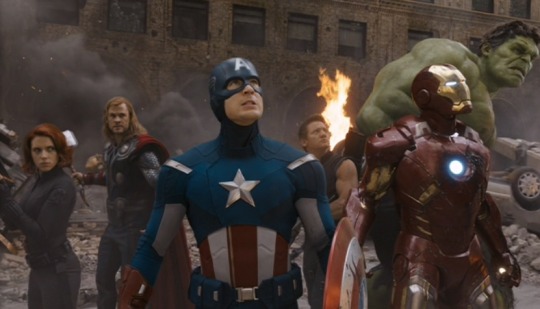
Does it pass the Bechdel Test?
No.
How many female characters (with names and lines) are there?
Three (23.07% of cast).
How many male characters (with names and lines) are there?
Ten.
Positive Content Rating:
Three.
General Episode Quality:
It’s solid. Unpopular opinion? I don’t think it’s half as good as people made it out to be, back when it first hit cinemas and everyone was swooning. It’s solid, but that’s the best I’ve got for it.
MORE INFO (and potential spoilers) UNDER THE CUT:
Passing the Bechdel:
...

Female characters:
Maria Hill.
Natasha Romanov.
Pepper Potts.
Male characters:
Nick Fury.
Phil Coulson.
Erik Selvig.
Clint Barton.
Loki.
Bruce Banner.
Steve Rogers.
Tony Stark.
JARVIS.
Thor.
OTHER NOTES:
‘free from freedom’ is such a wanky piece of writing, man. It’s absolute nonsense, but it sounds vaguely profound if you don’t think about it at all. I thought about it. It’s idiotic.
The very first thing we see of Black Widow in this movie is her being hit in the face, wearing a slinky little dress, tied to a chair being interrogated by a bunch of men. We’re supposed to indulge this excuse for hurting and objectifying a woman and then write it off as ‘empowering’ because she beats the Hell outta the dudes a couple of minutes later. That’s not a game I’m interested in playing. This is garbage.
The classical music over the beginnings of the Stuttgart attack is great.
All those German folks so confused by this Loki dude speaking English at them. What a tool.
I’m not sure I’ve ever heard ‘not today’ used as an effective badass declaration. It’s ALWAYS cheesy. Make it stop.
“There’s only one God, ma’am, and I’m pretty sure he doesn’t dress like that.” I don’t really like this line for Steve; he just doesn’t seem like the kind of guy who would play the ‘one true God’ card, and there was nothing in his origin story which implied that he’s particularly attached to religion at all; plus, he already read the brief on Thor, he knows this is literally the old Norse deity, there’s no question of whether or not they’re dealing with a God here. To argue the point (because he’s not MY God!) is meaningless in context, and feels like a weak attempt to correlate (Christian) faith with being ‘old-fashioned’, like OF COURSE Steve would defend the idea of the ‘one true God’, he’s from the past, not a cool enlightened atheist/agnostic modern man like the rest of us, right?
Thor and Loki are using such archaic phrasing, when Tony makes his ‘Shakespeare in the Park’ joke, it’s...more an observation than a quip. The Asgardians were not half as stuffy in Thor. It makes it seem like someone didn’t bother to see that movie first before writing their version of the characters.
Thor has to fight with the others when he shows up. He’s just gotta.
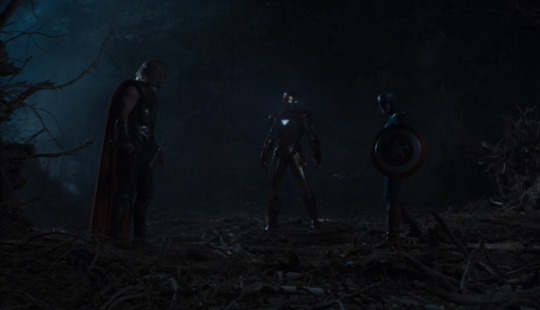
Gotta give a nod to Mark Ruffalo’s work here; I feel like I can see the clear comparison between his version of the character and Edward Norton’s in The Incredible Hulk, but at the same time there’s no sense of this being a Norton’s-Banner impression. Ruffalo is doing a sweet job of making the character his own without totally overhauling the template Norton laid down, and I dig it.
Oh, here we are. Loki calls Black Widow a ‘mewling quim’, which is just a fancy way of calling her a whiny cunt. Your gendered slur is still a gendered slur, movie.
I know they’re playing the idea that the sceptre is causing the antagonism between the characters, but fuck, it’s tedious. It just feels like they’re all contrived petty versions of themselves, being shitty because it’s ~dramatic~ for them to not get along.
I didn’t see this movie until months after it was released, and people were raving about how crushed they were by the major character death in the film but they were doing a pretty good job of not spoiling it; good enough that for a moment, I really thought I’d get to enjoy the surprise/horror for myself. You know who spoiled it for me? In a tweet, no less? It was the 44th President of the United States. Thanks, Obama.
This guy is the MVP of this film:
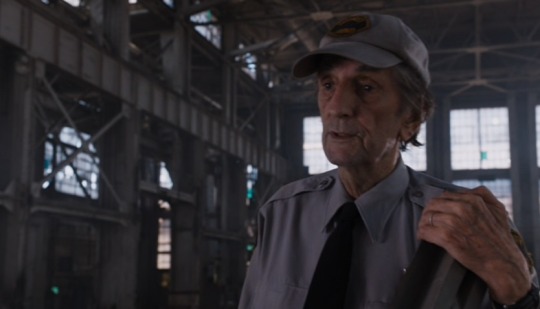
You can chalk “Son, just don’t,” up on the list of Things Steve Rogers Would Not Say. Just because he’s technically in his nineties doesn’t mean he isn’t still in his twenties in his mind: I don’t buy that he’d go for a blithely patriarchal term like ‘son’, it seems like another poorly-considered attempt to make him sound old-fashioned. Juxtapose that with ‘just don’t’, which is very modern vernacular. It might seem clever to combine the two as a meta-expression of Steve belonging to two different times now, but in practical application it just sounds out-of-character, and there’s nothing clever about that.
I know I said after the last movie that I love it when someone gets hit and flies off-screen in an exaggerated fashion, but Hulk punching Thor off-screen after they finish working together to take down the big beastie is an exception, because there’s no reason for Hulk to decide to hit Thor in the first place, it’s just a gag for the sake of a gag. I can’t believe they messed up such a simple pleasure.
I will forgive it, in return for Hulk smashing Loki all over the place. That was funny.
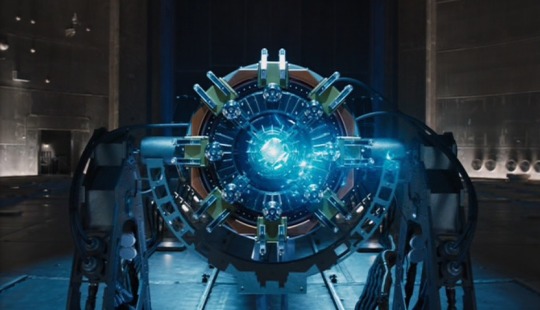
Back when this movie came out, before I saw it, I had people tell me - straight-faced, totally sincere - that it was one of the best movies they had ever seen. The internet was on fire with Avengers love. The film was rated in the IMDb Top 20. Admittedly, that all sets a pretty impossible standard for a movie to meet, and being at least a little disappointed in the result is probably a given. I was not particularly invested either way (I didn’t fall down the Marvel rabbit hole until later), so I didn’t allow myself to go in to my first viewing with such lofty expectations to be crushed, just the general assumption that this was gonna be good, it had to be good, at minimum. And it was that; it’s a good film. It’s entertaining. The plot makes basic essential sense. It’s easy to follow. There are some nice visuals, and most of the special effects are relatively clean, which can be a significant difficulty for big-budget extravaganzas that sometimes/often try to get way too much spectacle bang for their buck, so, a nice win. All in all, The Avengers is not a bad film. Sure is a bland one, though.
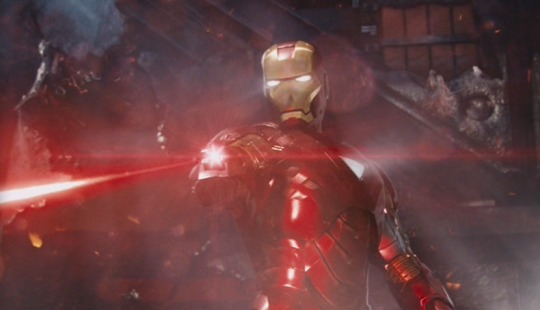
I know, I know, getting all these big-name characters from previous films together in one movie was a serious task and it’s hard to write a well-balanced script for so many leads, blah blah. Let’s put that whole equivocation to bed right now, because I honestly don’t think that balancing the big-name cast was the problem. All of the characters had something to do, no one felt like a random extra, I could quibble about certain places where I really wish things had been plumped up a bit (pretty much everywhere - the film is extremely low on meaningful character beats), but ultimately the characters are fairly evenly presented. What makes this movie bland to me is 1) the way that the personalities of the characters deviate from that established in their previous films, and 2) the simplicity of the story they inhabit.
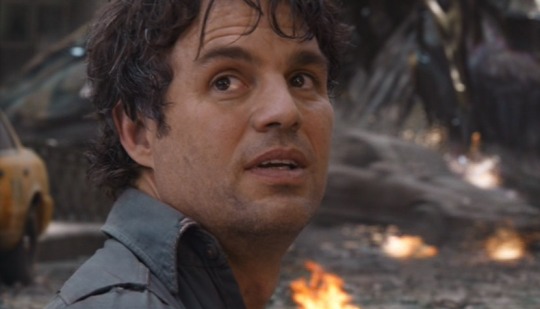
We’ll cover the Avengers themselves first: the good news is, Tony Stark is still Tony Stark. His personality is intact. Bruce Banner is, as noted, not exactly the Bruce Banner we met back in The Incredible Hulk, but that’s both a given and a good thing - the casting change is an improvement. Hawkeye was barely in the MCU previously, so we don’t really have enough to compare him against in order to make a judgment. Black Widow, however, is a bit of a mess; Joss Whedon’s special brand of misogyny is on display from moment one, as noted above (he LOVES writing women being brutalised because ‘how would we know/believe that they’re strong if we don’t get to see them overcoming mistreatment?’ - he tends not to feel the need to ‘prove’ his male characters’ strengths in this way), and Natasha’s personal story for the movie continues in a distinctly gendered vein: as is common for female characters being written by shitty dudes, her arc revolves predominantly around a man (Hawkeye), and she is ‘emotionally compromised’ by her attachment to him. She also zones out in the middle of an action scene and winds up in a corner shaking and traumatised (very out-of-character for a super spysassin), and particular emphasis is placed on all the bad things she’s done in the past and how she should feel bad about it, though no one does more than shrug their shoulders about Clint or Fury or any of the other SHIELD agents who are acknowledged as having dark and dirty pasts. Why is Natasha the one who is singled out to have her morality judged while her ‘arc’ focuses on her inconvenient emotional engagement? You know why. There’s no reason why this particular tack had to be taken in bringing her backstory into the film, and as a result of it we spend little time with Black Widow displaying the kind of cool professionalism and self-assurance she had in Iron Man 2. The inclusion of that vulnerability and backstory doesn’t make her feel more rounded or complicated because it is deconstructing the power and mastery of the character; rather than building upon the foundation set in her previous film visit, we’re questioning the stability of that foundation and seeing if we can get a few pieces of the structure to rattle loose.
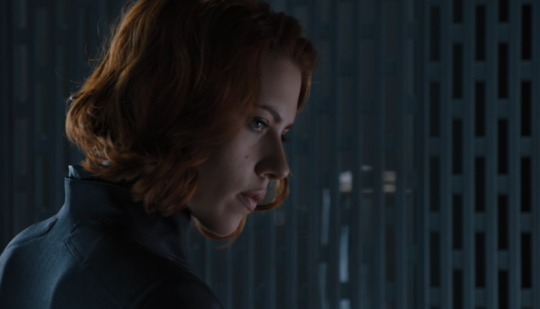
A big part of the trouble for Thor is that he gets saddled with that poxy Ye Olde Cliche dialogue, and there are few things worse for achieving character consistency than changing the way that they talk: no matter how hard the actor tries to play the character the same, they can’t compensate for the fact that the very structure of their sentences has been remodeled. They can improvise rephrasing the lines and/or argue the point if they want, but it’s hard to challenge every line, and if the director (who, oh look, is also the writer) insists you follow the script verbatim, there’s not a lot you can do with that. Poor Captain America suffers the same fate with the overt attempts to make him sound ‘old-fashioned’ by having him utter words and phrases that he never used in his origin movie. What’s worse is, this stilted dialogue is pretty much the sum total of the film’s acknowledgment of the fact that, oh yeah, Steve just recently woke up from the ice to find that seventy years has passed and nearly everyone and everything he used to know is gone. He has an exchange with Fury in his first scene, about ‘getting back in the world’, but there’s zero follow-up on how he’s handling it, what difficulties there might be, or even just how Steve is feeling about all of this on a basic emotional level. And yes, I am aware that there’s a deleted montage of Steve going about his day being isolated and out-of-touch, and it’s a travesty that they cut it because that’s essential character content, but it’s also a total bare minimum which has zero follow-up. Steve Rogers spends the whole film just being...there, speaking lines that don’t suit him or reflect the personality we just saw in The First Avenger, and not even in an understandable character-development ‘throwing myself into my work to hide from the pain’ kind of way. He’s kinda blandly self-righteous and all-business no-pleasure in exactly the way he was NOT in his origin movie; my impression is that Whedon doesn’t care for the character and wrote him off as the traditional patriotic cliche one might have expected him to be instead of the nuanced character that he actually is. As with Thor and Loki, it feels as if Whedon didn’t bother to watch the previous movies first in order to get a sense of the established characters.
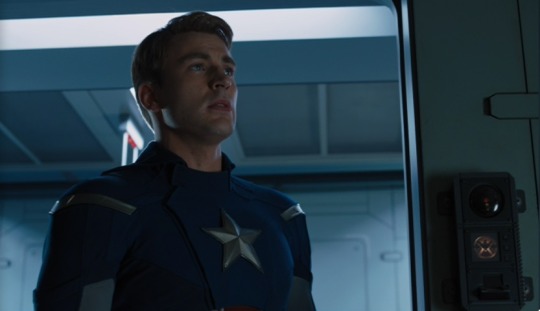
Speaking of Loki: if there’s one character who really, REALLY suffered a personality change in this script, it’s him. None of what made Loki the highlight of Thor is in evidence here; where that character was a cunning plotter full to overflowing with complex and contradictory feelings for his family and driven to action by that same emotional cascade, this Loki...wants to rule the Earth. Because. He’s, like, crazy, the other characters all say so, even Thor - the only one who actually knows Loki and is fit to assess his mental state - says that his ‘mind is far astray’ (what Thor thinks of that, whether he’s surprised or concerned, whether he feels like he understands why this has happened to Loki or not, is unclear, because, I dunno, Thor having feelings is as inconvenient to the story as Steve having feelings - as Loki snarls derisively about ‘sentiment’, we must remember that being emotionally compromised is dumb and only for women? Hmm). Loki is just a placeholder villain in this film, driven to action by nothing in particular, it’s just a business arrangement with a mysterious third party that coincidentally happens to involve Earth. Loki prattles and hollers a lot about how ruling is his right and people want to be ruled and blah despot blah, and it’s both supremely uninspired, and not true to the character we met in Thor at all - the Loki we know was not obsessed with ruling, his motivations were all about his family standing and the things he was denied within those relationships and their implications. I remember fandom, back when this movie came out, scrambling with various headcanons about Loki losing his mind in the void or being brainwashed, ad nauseum, because no one really seemed to feel like they were watching a logical progression of the same character at all.
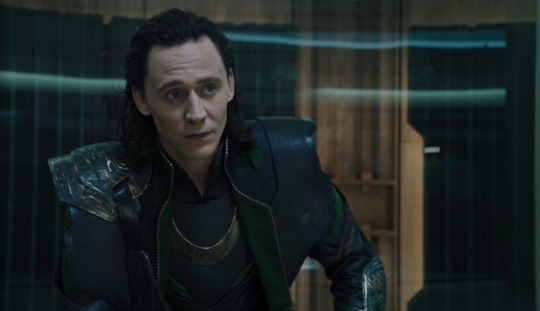
Now, one of the main ways that the lack of character consistency contributes to narrative blandness is that it disrupts narrative immersion - we’re re-negotiating the way that we engage with the characters, and that distracts from engaging with the story itself. At worst, we may even find ourselves cynical about every decision that a character makes (whether it’s in-character or not), because we’re too aware of the man behind the curtain to buy the act. There are definite shades of that in this film, but the worst of it comes from the whole team-antagonism schtick that is vaguely blamed on ‘Loki’s manipulations’ and the sceptre. The thing is, this all requires the characters to behave out-of-character, and since they mostly already are out-of-character due to bad writing, the exacerbation of that by creating artificial conflict feels like more bad writing, not actual plot. Having the characters initially get along poorly before triumphantly uniting to win the day is such an overused device, it’s easy to construe the conflict as arbitrary, and as it turns out...it is. Loki/the sceptre causing the Avengers to argue doesn’t actually impact the narrative in any meaningful way, since they don’t start a fight or fracture over it, it doesn’t slow down Tony’s efforts to learn what Fury is really up to, nor does it prevent Steve from investigating the same thing in person. Them conflicting with Fury and questioning their decision to work with SHIELD, etc, is a normal thing to have an argument about, no magic-mind-stick required; the only mileage the movie really gets out of the forced-conflict ploy is that Steve and Tony keep pissing on each other, which is extremely OOC for nice-guy Steve and WOULD throw up a big red flag for mental manipulations if the movie weren’t already misrepresenting him as an insufferable stick in the mud anyway, and even for Tony it feels off - he’s generally a jerk as a rule, but he doesn’t pick unprovoked fights - but again, when the movie is already so left-of-centre on so many characters everyone feels off, so it’s easy to assume the characters are just falling victim to contrived drama, and not something in the actual story. As noted, it doesn’t end up mattering where the conflict comes from anyway; the bad news is, it takes until the halfway point of the Goddamn movie before the characters get their prescribed ‘rough patch’ out of the way. The fact that they were just being really annoying for no real reason and without narrative consequence kinda steps on the idea of it being ‘triumphant’ when they all come together at the end to fight Loki, because there was zero reason for the audience to ever legitimately doubt that it would happen, not even in a begrudging-putting-this-genuine-disagreement-aside-so-that-we-can-save-the-world kind of way. It’s just dead air with no weight behind it, and with characters reduced to such cliche versions of themselves that it’s hard to muster the will to care.

AND SO, we have a movie which, as previously noted, is awfully damn simplistic. That’s not a terrible thing, in and of itself - it’s all about what you do with an idea, and I would posit that a more complicated plot wouldn’t be a great idea here since there are so many primary moving parts in the form of characters to justify. But, the aforementioned griping about the skewy characterisation makes this film a bad candidate for character-over-plot, and if the shenanigans are falling flat, that’s when simplistic plotting becomes a problem. It goes like this: Loki shows up and steals the magic cube (action ensues). The avengers assemble to catch Loki (action ensues). The characters argue on a helicarrier until Loki’s goons show up to wreck shit (action ensues). Loki escapes and goes to New York to use the magic cube to portal an alien army to Earth. Action ensues until the portal is closed and Loki is defeated. The end. I’m not complaining about the action - it’s a standard facet of the genre, and most of it is entertaining enough (though the unnecessary Thor/Iron Man fight I coulda done without, and the battle of New York runs a bit long) - but the plot itself is pretty point-A-to-B-to-C without much in the way of surprises, and like I said, that’s fine so long as you’re delivering in another arena, i.e. STRONG CHARACTER NARRATIVES. And character is sooo far from being this film’s strong suit. The result? Is not very compelling.
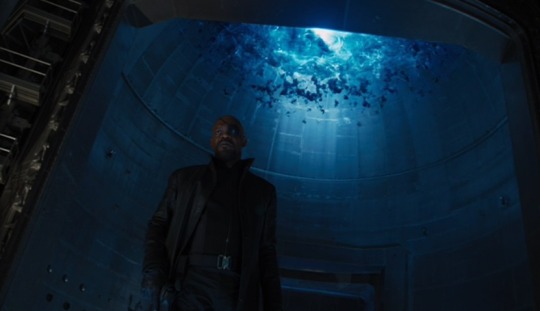
It tends to wind up that, by the time I get to the end of explaining why I think a thing didn’t work (and this is...the abridged version), it maybe seems ridiculous that I’m also saying ‘this thing isn’t that bad’. The truth is, there’s nothing that I think this movie does impressively well, and there are a lot of pretty major things that I think were poorly handled. BUT, I still meant what I said: it’s entertaining. It makes at least basic sense, and flows easily enough. And while I have serious issues with a lot of the characterisation and feel that - though balanced(ish) in handling - the plot failed to take real advantage of any of the character resources at its disposal (except maybe Tony), the actors still brought the goods to the table, and those whom I enjoyed in their previous films (I mean you, Chris Evans) didn’t disappoint, even though the material they were handling did. It’s a solid film, it’s good fun, I don’t regret watching it, and while I am irritated by various aspects, I don’t feel the need to keep ranting about them. And hey; Mark Ruffalo is really very wonderful. They’ve got that going for them.
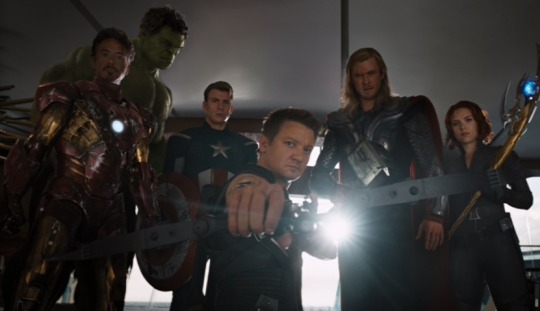
20 notes
·
View notes
Text
Should the story of the woman caught in adultery be removed from the Bible? Um, NO, and here is why:

The story of the woman caught in adultery is one of the most powerful historical events to be found in the Gospels. It speaks to the heart of God’s love and mercy, a love that we are to share in our hearts, a love we are to share with the world. It is also a foreshadowing of the gift of grace and salvation to come, a gift won by the physical death and resurrection of Christ, a gift that can bring about our own spiritual resurrection. Who cannot feel compassion as this woman is dragged before the public, an invisible scarlet letter emblazoned on her chest as the religious leaders speak out loud about her sin? Who cannot feel her broken spirit as they mention the Old Testament laws about how those guilty of adultery were to be stoned? And who cannot feel her shock and relief when Jesus states ““Let him who is without sin among you be the first to throw a stone at her.” (John 8:7). Who cannot imagine her exhilaration when Jesus said that he did not condemn her?
What a beautiful story of Christ! It is almost impossible to imagine the Gospel of John without it.
And yet, there are many Christians who want it removed from the Gospel of John!
I repeat: there are many Christians who want it removed from John’s Gospel!
Now why, pray tell, do they want it taken out of the Bible?
The following note in the ESV bible offers a clue:
“The earliest manuscripts do not include John 7:53-8:11.”
That’s right. The Oldest copies of the Gospel of John that we have do NOT have the story of the woman caught in adultery, which is also called the Pericope Adulterae. Indeed, the earliest copy we have of the Gospel of John that has the story dates from the 5th century AD (though this doesn’t mean that there weren’t earlier copies of John with the passage in it. Not all manuscripts from the ancient world have survived to the modern era. Thus, some may very well have had it. Indeed, there is evidence for this; the Pericope Adulterae made its way into Jerome’s Latin Vulgate Translation in 383 AD, in the 4rth century AD (the year he finished translating the gospels. The Old Testament was translated into Latin from Hebrew by 405). This seems to have been a story that was circulated for a time and then later added to John. Indeed, it is believed by many to have been part of the early Christian oral tradition, just as the rest of the Gospels were before they were put into print. Though many scholars accept that it tells a historical event, its placement in scripture has been a point of debate. Indeed, there was some debate in the ancient world about it as well (more on that later).
So…the Apostle John didn’t write it, its not in the earliest manuscripts of John (i.e. that we have), and therefore, according to many Christian scholars, it should not be considered scripture.
Seems like a pretty strong case, doesn’t it?
It would be, if it wasn’t for the fact that its based on both the special pleading fallacy (aka double standard) and a refusal to accept the early church father’s testimony about it.

Let’s deal with the latter issue first.
Didymus the Blind, a Christian theologian who lived in the 4rth century, wrote that the story was found in “certain gospels”. It was presented as a historical event in the third century Christian document the Didascalia Apostolorum. Jerome, who translated the bible into Latin (the “Latin Vulgate”) put the story in his translation, even though he acknowledged that it wasn’t found in some versions of John. However, he stated that it was found in many Greek and Latin manuscripts of his day. Augustine was a big supporter of the passage. Indeed, he mentions something quite sinister about Christian leaders who opposed the story in his lifetime:
“…certain persons of little faith, or rather enemies of the true faith, fearing I suppose, lest their wives should be given impunity in sinning, removed from their manuscripts the Lord’s act of forgiveness toward the adulteress, as if He who had said, 'sin no more' had granted permission to sin.”
Augustine, De Adulterinis Conjugiis, 2:6–7.
Thus, people were removing it from the scriptures.
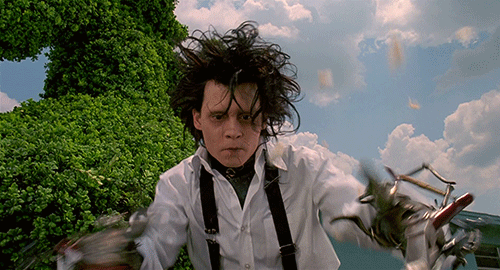
Is it any wonder, then, that none of the early copies (before the 5th century AD) of John that survived to the modern era don’t have it? Some must have, in order for Jerome to have put it into his translation (remember, he also said there were many Greek copies in his time that contained it).
Now, some have discarded Augustine’s testimony, saying that he also defended the Old Testament Apocrypha (1rst and 2nd Maccabees, Judith, Tobit, Ecclesiasticus, etc.), which are found in the Catholic Bible but not in the protestant bible (save for some King James Bibles). This is a genetic fallacy, a logical fallacy where someone disregards an argument based on its origin instead of on the merit of the argument itself. Yes, Augustine did have some bad theological views, but so did Martin Luther, who started the Protestant Reformation (Luther wrote an anti-Semitic theological book titled “On the Jews and Their Lies”. I guess we should all be Catholic now…). Plus, the fact of the matter is that Augustine actually didn’t consider the apocrypha on par with scripture.
“So what?” the enemies of the Pericope Adulterae will say, “Its still not in the early manuscripts of John! John didn’t write it, therefore it’s not scripture!”
Really?
Really want to go down that road?
Well, then you might as well cut out sections from the Pentateuch as well…

For many ages, Moses was considered the sole author of the Pentateuch aka Torah. Genesis, Exodus, Leviticus, Numbers and Deuteronomy were thought to have been entirely pinned by Moses. Then skepticism reared its ugly head, and many scholars rejected the idea of Mosaic authorship, pointing out passages that proved problematic to it (more on them later), as well as repetitions that differed in details and different names of God being used in certain parts of the books (including some areas where Yahweh was used in stories that take place before Moses. The name of Yahweh wasn't revealed to humans until God spoke it to Moses, according to Exodus 6:2-3). This led to the Documentary Hypothesis, the idea that the Torah was written in stages over many centuries, with no parts written by Moses. Eventually, these documents were put together as the Torah.
Interesting idea, but even it has recently come under scrutiny, primarily due to the fact that ancient near eastern literature was known for odd repetitions that at times differed on details (see Paul’s conversion tales in Acts 9, 22 and 26). Individual storytellers and writers in the ancient near east did this, and Moses would have been expected to do the same. Other aspects of the Documentary hypothesis, including the use of different names for God in some passages, likewise fails under closer scrutiny (The passage in Exodus 6:2-3 can be translated to mean that “Yahweh”, as a name for God, was known of long before Moses was born).
Personally, I’ve never accepted the documentary hypothesis, in part due to the fact that there are multiple verses that indicate that Moses wrote a significant amount of the Torah (Ex 17:14, 24:4-8, 34:27, Num 33:2, Dt 31:9, 19, 22, 24). Combined with the fact that most of the material from Exodus to Deuteronomy deals with Moses’ life, as well as the answers to objections about repetitions, differing details and the use of different names of God noted above, one can conclude that a good case can be made for Mosaic authorship of the Pentateuch or Torah.
But did he write the entire Torah?
Um…Nope.

Genesis 12:6 is our first clue:
“Abram passed through the land to the place at Shechem, to the oak of Moreh. At that time the Canaanites were in the land.”
At that time…the Canaanites were in the land.
Now, if Moses wrote this, then there is a BIG problem.

You see…the Canaanites were STILL in the land while Moses was alive! The Israelites hadn’t even invaded the land yet (Dt 26:1)! That didn’t happen until after Moses died, when Joshua led the invasion (se Joshua chapters 1-3). Indeed, if you read the book of Joshua closely, chapters 13-18 show that, despite the hyperbolic statement of Joshua 11:23…the land had not been fully conquered. After Joshua died, there were still Canaanites in the land (as shown in Judges chapters 1-2). Indeed, they were still in the land during the time of Ezra, when the Israelites returned to Israel during the time of the Persian Empire (Ezra 9:1)! This happened during the reign of Cyrus the Great of Persia, who conquered Babylon in 539 BC and then gave the Jews permission to go back home.
Cyrus died in 530 BC.
Moses lived about 1400 BC.

Next, let’s look at the Edomite Kings list in Genesis 36:31-39:
“ These are the kings who reigned in the land of Edom, before any king reigned over the Israelites. Bela the son of Beor reigned in Edom, the name of his city being Dinhabah. Bela died, and Jobab the son of Zerah of Bozrah reigned in his place. Jobab died, and Husham of the land of the Temanites reigned in his place. Husham died, and Hadad the son of Bedad, who defeated Midian in the country of Moab, reigned in his place, the name of his city being Avith. Hadad died, and Samlah of Masrekah reigned in his place. Samlah died, and Shaul of Rehoboth on the Euphrates reigned in his place. Shaul died, and Baal-hanan the son of Achbor reigned in his place. Baal-hanan the son of Achbor died, and Hadar reigned in his place, the name of his city being Pau; his wife's name was Mehetabel, the daughter of Matred, daughter of Mezahab.”
Now, did you catch that first verse? Let’s look at it again:
“These are the kings who reigned in the land of Edom, before any king reigned over the Israelites.” (emphasis mine)
Moses didn’t write that.
How do I know?

Because King Saul, the 1rst King of Israel, didn’t live until centuries after Moses! Heck, his reign marked the end of the Judges period!
Now, to be fair, Abimelech, son of the Israelite Judge Gideon, was made king of Shechem, and ruled Israel for 3 years (Judges 8:30-9:22). However, his kingship wasn’t instituted by God (thus God didn’t recognize it, see Dt 17:14-17). He was an evil king, and during a battle a woman threw a millstone onto his head. Not wanting to die due to a woman, he had his armor bearer run him through with a sword. This was all due to the wrath of God (Judges 9:1-57).
Oh, he also lived long after Moses and Joshua.

Now, some may say that there may have been a king who reigned during Moses time, someone who wasn’t mentioned in the Bible. Well if that’s the case (no evidence for it whatsoever), then how do people who believe that explain Deuteronomy 17:14-17:
“When you enter the land the LORD your God is giving you and have taken possession of it and settled in it, and you say, "Let us set a king over us like all the nations around us," be sure to appoint over you a king the LORD your God chooses. He must be from among your fellow Israelites. Do not place a foreigner over you, one who is not an Israelite. The king, moreover, must not acquire great numbers of horses for himself or make the people return to Egypt to get more of them, for the LORD has told you, "You are not to go back that way again." He must not take many wives, or his heart will be led astray. He must not accumulate large amounts of silver and gold.”
Thus, many of the Edomite kings in the Genesis 36 kings list lived long after Moses.
Ergo, Moses didn’t write Genesis 36:31.
It’s also safe to say that he didn’t write Deuteronomy 34, which records his death. No one writes their own obituary.

Some try to say that Moses was writing about his upcoming death as a prophecy, but if he did…why did he describe it in the past tense?
Indeed, the passage seems even less like a prophecy in verse 10:
“And there has not arisen a prophet since in Israel like Moses, whom the LORD knew face to face,”
Indeed, in Dt 33:1, right before he gives his final blessing on Israel, it states:
“This is the blessing that Moses the man of God pronounced on the Israelites before his death.”
Similar arguments have been made for Genesis 12:6 and 36:31. Some have tried to make the case that both are actually prophecies penned by Moses, the former referring to the eventual removal of the Canaanites, the latter to future Edomite kings and the future Israelite monarchy. However, just like the passages about Moses’ death, they are described in the past tense. There is a reason for that; Genesis is a history, not a prophetic book. True, it does record some prophecies (Genesis 3:15, 15:4-5, 13-16, etc), but Genesis 12:6, 36:31 and Deuteronomy 33:1 and 34:1-12 (Deuteronomy is also a history) are written in the past tense, meaning...that they already happened when these passages were written down. They are no different from the rest of the historical passages in the Torah. They are structured as history, not prophecy. To say otherwise is to commit eisegesis, instead of considering the historical facts of the Bible.
Let’s face it: Moses didn’t write these particular passages. Indeed, there are no doubt other parts of the Torah that he also didn’t write. Though Moses wrote the Torah, people added to it over time. Indeed, some of these additions were put in centuries after Moses’s died.
Just like the story of the woman caught in adultery was put into the Gospel of John a few centuries after it was written…
This begs the question; why are the same people who want to cut out John 7:53-8:11 not raising a ruckus about these passages in the Torah that Moses didn’t write?
Why the double standard??

I could understand a little if they believed in the Documentary Hypothesis, but the Documentary Hypothesis doesn’t jive with the Biblical evidence for Mosaic authorship seen above. Whether one thinks that Moses wrote a little bit of the Torah, or most of it, there is no denying that some of the Torah was written much later.
And yet, the scholars who dismiss John 7:53-8:11…don’t dismiss Genesis 12:6, 36:31, or Deuteronomy 34.
I once had a short twitter debate with a Biblical scholar (whose name I won’t mention) over the Pericope Adulterae . When I brought the passages up in the Torah that Moses obviously didn’t write, then asked why he didn’t want them gone because they weren’t written by Moses, yet still wanted John 7:53-8:11 gone, because it wasn’t written by the Apostle John, he said “That’s not how textual criticism works.”
What a way to sugarcoat a Special Pleading Fallacy.
Now, some will cry foul, saying that there was controversy over the passage even during the ancient world.
Well...guess what?
Come on, guess what?
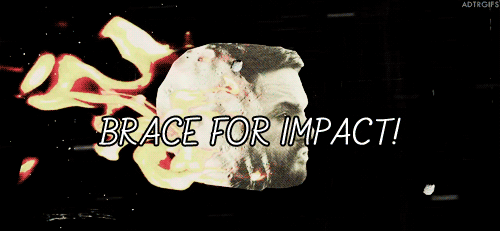
There was also controversy over Jude, James, Hebrews, the Book of Revelation, 2 Peter and 2 and 3rdd John! Indeed, in the third century, these (and several other NT works) were at times excluded from scripture! Though there was already recognition of some NT books being canon in the 1rst century (2 Peter 3:16) it wasn’t until 367 AD that the New Testament canon acquired its current form.
Folks, Textual criticism is an interesting field of study. To see what was originally in a historical document and then dismissing what’s not can be comparable to a surgeon removing a tumor from a body. But we also have to remember that God is the ultimate author of the Bible, inspiring John, Moses and countless others to write these sacred treasures. The story of the woman caught in adultery is no different. To remove it from the Bible would be like a surgeon removing a healthy organ from a body. Like Jude and the book of Revelation, this passage passed the test of the ancient church and later the reformation (when the Old Testament Apocrypha was removed). It speaks to the character of Christ, whose life perfectly reflected the truth that God is love (1 John 4:8,16).
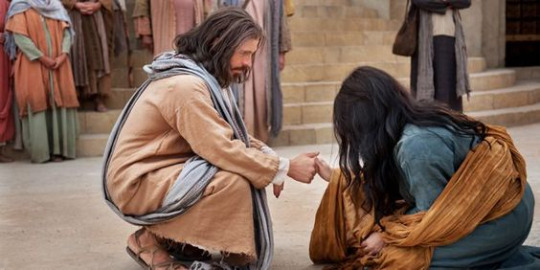
Sources:
“Nelson’s Dictionary of Christianity” by George Thomas Kurian (Editor), 128-29
“Encountering the Old Testament” by Bill T. Arnold and Bryan E. Beyer, 168-169
“The Apologetics Study Bible (Holman CSB), 1587
“Archeological Study Bible (NIV)”, 15 “Oxford Guide to the Bible” by Bruce M. Metzger and Michael D. Coogan (Editors), 102-104
https://www.britannica.com/topic/Vulgate
https://www.bibleodyssey.org/en/passages/main-articles/woman-caught-in-adultery
https://confessionalbibliology.com/2016/03/29/response-to-james-white-on-augustine-and-the-pericope-adulterae/
https://purelypresbyterian.com/2016/12/01/defense-of-the-pericope-adulterae/
https://www.ancient.eu/Cyrus_the_Great/
https://www.ancient.eu/Moses/
https://www.jewishvirtuallibrary.org/martin-luther-quot-the-jews-and-their-lies-quot
https://www.christiancentury.org/article/critical-essay/on-luther-and-lies
https://www.logicallyfallacious.com/logicalfallacies/Special-Pleading
https://yourlogicalfallacyis.com/special-pleading
https://www.logicallyfallacious.com/logicalfallacies/Genetic-Fallacy
https://yourlogicalfallacyis.com/genetic
http://textualcriticism.scienceontheweb.net/FATHERS/Augustine2.html
0 notes
Text
Thoughts on Game of Thrones S07E07
It’s over. It doesn’t mean we won’t hear about the show anymore, as mainstream media tends to make a huge noise over every little rumour for the upcoming season, but at least we now have some distance between ourselves and a new episode of GoT. Let’s enjoy it.
I’ve heard that the critics are back to praising the show, which surprises me but also doesn’t. On the surprised side, I’ll give that this was better than S07E06, but it was still far from a good episode overall. On the unsurprised (but disappointed nevertheless) side, people praising GoT despite all the inconsistent characterizations, plot contrivances, awful dialogue, and shoddy worldbuilding isn’t exactly new. If this season was the breaking point for only a handful of people, I’m already happy.
We had an extra long episode and I have no idea why. There was a lot of stalling, especially in the King’s Landing subplot. It’s amazing how D&D can put useless crap on screen and actually relevant events and character development offscreen. Priorities.
I’ll probably post a season review at some point, but for Sunday’s episode here’s what I have:
King’s Landing
I’m gonna be honest: I watched this episode yesterday and I barely remember most of the dialogue now. This isn’t a very good effect for one of the most relevant gatherings in your entire series, but that’s hardly the first time one of the show-exclusive “big moments” didn’t work for me.
Part of the reason for that is the conga line of contrivances that led to this meeting. The removal of Aegon’s storyline from the books left Daenerys and Cersei to fight each other, with the septsplosion last season and the show-only Lannister poverty making the odds even worse for Cersei. To give the Lannisters a chance, D&D had #TeamDany coming up with stupid plan after stupid plan. Even so, they still have two dragons and the bigger army, while Cersei’s Golden Company is a Narrow Sea away; they could have ended the war in this episode if they wanted to. Why didn’t they try this instead of a truce?
You can argue this would weaken their forces against the army of dead, except: a) Dany accepted the idea of a truce even before she was fully convinced of said army’s existence; b) they should know better than to trust Cersei Lannister. Despite Cersei’s inconsistent characterization (Lena Headey is a goddess doing wonders with that character), I think we can all agree that nobody expected her to suddenly work for the good guys. The characters don’t know Cersei had her own pet zombie, but we do (and apparently everybody around her, since she keeps calling him Ser Gregor?) so the presence of the wight is hardly a game changer.
Other than that, there was a lot of walking and stalling and characters restating the same things they said before. Not very exciting. Though I legit enjoyed Qyburn’s necromancer bonner when he saw the wight.
But see, here’s a problem: we got more emphasis on secondary characters like Qyburn, Bronn, or the Hound than more important characters like Daenerys or Brienne. The Hound in particular got a lot of screen time this season and there was some heavy CleganeBowl foreshadowing, because of course D&D would do CleganeBowl. That’s why I keep calling the character “Hound” and not “Sandor”. What’s even character development. Or themes.
Brienne of Tarth said “fuck loyalty”. What’s next, Sansa Stark murdering a man out of revenge and smirking at the sound of his screams? Oh wait...
What is Euron still doing in the story? There was a lot of teasing that he would be worse than Ramsay, but for the moment we got nothing. He’s Littlefinger 2.0: a shadow of his book self, damned because the showrunners don’t know what to do with him and can only think of stupid subplots to keep him around for some mysterious reason.
Cersei and Tyrion meeting is another evidence of how talented Headey and Dinklage are, yet the scene accomplished very little in terms of storytelling and characterization. The show barely explored the emotional consequences of Tywin’s murder for Tyrion, nearly dropping this entirely after season five, so it’s hard to feel it when he claims to hate himself for it. Shae got it even worse and her murder was forgotten altogether, something that I should have seen coming back in season four when they Greedo-ed her death scene.
It’s hard to believe Cersei would pass a chance of killing Tyrion, even without the valonqar prophecy. Why did they do this? It makes Cersei even more inconsistent (they’re certainly not gonna redeem her character or anything) and makes Tyrion’s plot armor even more obvious. This was the show that seven seasons ago would have responded Tyrion’s “give him the order” with “Ser Gregor, kill him”, followed by Tyrion dead. Ned and Robb Stark did not die for this.
Speaking of Ned, I can’t stand those references to R+L=J (A?). Seriously, guys, this isn’t clever, especially not in a show with so many dick jokes. We got it the first ten times.
Jon is an essentially good character in the books, but the show is trying to make him a saint. A dumb saint, of course, because again being honorable and honest is framed as stupidity and cleverness is something evil. Just a reminder: Ned Stark lied too. In fact, one of his biggest lies became this show’s hero, but I don’t expect D&D to notice that.
I still don’t know wtf they want with the Cersei pregnancy subplot. Cersei and Jaime seemed to have broken up for good, but we thought that before and we were wrong. Particularly when Cersei became the personification of Jaime’s worst nightmares, performing the act that he broke his vows to prevent. But hey, nothing stands in the way of true love, right?
Speaking of true love, the show romance of Jon and Daenerys is finally a worse love story than Twilight.
Things I legit enjoyed: the snow falling in King’s Landing. A bit sudden, but still a beautiful sequence.
Dragonstone
Everything about Theon was infuriating.
First we had more fellating of Jon, with both him and Theon stating their characters and motivations. This is lazy writing, pure and simple. If the audience isn’t already aware of Theon’s identity conflict, D&D have done a poor job as writers and this scene won’t fix it.
Here’s another thing: as much as I love the Starks, Theon doesn’t owe them anything. He wasn’t a bastard or a ward, he was a hostage. He was taken to Winterfell specifically so Ned could kill him in retaliation in case Balon did anything stupid (something he was likely to do because Balon).
Plus we already had Theon realizing the Starks were his true family back in season… three? Four? This shouldn’t come as a huge revelation, and least of all from Jon. What’s the emotional significance of Theon and Jon’s relationship in the show? This moment, if we needed it, should have happened with Sansa or Bran, two Stark kids he had an actual on screen relationship with.
Worse, how does Theon claims his place among the Ironborn? With toxic masculinity! The fight scene was overly long, entirely unnecessary, and terribly offensive. I missed the whole kick-in-the-crotch thing and I’m glad I did because I might have thrown something at my TV. D&D have a repulsive track record in dealing with trauma and PTSD, and Theon’s in particular, but this was a whole new level. Mutilation and torture aren’t funny and shouldn’t be used as a joke. I can’t believe I have to actually say this!
Ugh, fuck this show.
Winterfell
I have to confess actually I enjoyed the Winterfell scenes, despite everything that led to them.
Again the show is damned by the poor foundation they establish for their big moments. Yes, watching Littlefinger exposed by Sansa is almost wish fulfillment, but there’s no reason this shouldn’t have happened earlier this season other than the writers really, really wanting to save it for the last episode. In order to achieve that, they came with the stupidest subplot of the entire series, putting Sansa and Arya against each other for reasons you can find only in the most insane and misogynistic posts on Reddit.
There’s no way to take this back. We have no indication that Arya and Sansa were pretending to fight this whole time and a few clues that they weren’t, so in the end Arya still threatened to rip her sister’s face off. This is disturbing and I refuse to ignore it. Yes, having the two sisters finally bonding is nice for a change, but nothing will give me back the brain cells that I lost watching the Winterfell plot this season.
Again women bond over murder, but at least this time they did it better: a public trial, with all of Littlefinger’s crimes listed, a clean execution, and no smirks of empowerment.
There are also minor nitpicks, such as Bran’s visions now counting as evidence, the fact that nobody had any reaction to Littlefinger’s crimes or execution, Sansa calling herself stupid, or the old “one Stark sister couldn’t have survived what the other did” debate. Get out of fuckin’ westeros.org forums, D&D!
Everybody misses Ned, but not Catelyn. Or Robb. Or Raccoon.
On a boat/Dornish lush forest
Boatsex did not live up to its hype. This was supposed to be the culmination of Jon and Daenerys’ feelings for each other, and… well, now that I phrase it this way, it was: it was just as bland and forced as all of their interactions this season. I thought I would remember Team America’s sex scene and I wasn’t disappointed with myself.
The editing was kinda weird too, jumping straight to some auntie fucking, with a seemingly jealous Tyrion lurking and a Robot-Bran voice over completing the creepiness. Okay.
So. The R+L=J revelation. There’s so much wrong with this scene I would need a whole essay tearing it apart. In fact, I may actually write one later this week. That’s how angry I am. A little preview, then.
We often speculate what show events will be or won’t be in the books in some form. Stannis burning Shireen or “hold the door” are likely to happen, though under very different circumstances. R+L=J is one of such events, and we know this revelation will happen in the books too. Among all fan theories, this is the strongest, considered canon by most readers.
It won’t happen in the books like this. There’s a lot about this scene that directly contradicts canon, both book and show. Maybe D&D don’t realize this because they’re hacks, but that hardly makes things better. This isn’t the first deliberate change to the source material, of course, but it’s one of the easiest to avoid and one with terrible implications.
First things first: Robert’s Rebellion didn’t just happen because Rhaegar abducted Lyanna, it happened because Aerys murdered Rickard and Brandon Stark when they demanded answers on this abduction, and then requested Ned and Robert’s heads. In doing so Aerys gave the middle finger to the entire feudal contract in the worst possible way, so he had to be removed. That Lyanna and Rhaegar loved each other doesn’t change this in the slightest. The Rebellion was still entirely justified.
So. Love. Maybe Rhaegar and Lyanna loved each other, but how long did it last? The murder of Rickard and Brandon Stark is show canon too. At some point Rhaegar learned about this, because the fight at the Trident happened. You know, Ragger was such a great guy that he decided the best course of action was to leave a pregnant Lyanna isolated in a tower and go fight defending his mad father. All of that is also show canon, by the way.
At what point did Lyanna learned that her father-in-law murdered her father and brother? Was she in a baby-making mood after that? If she never learned, it’s also bad because Rhaegar knew, and then we have rape by omission. If she did learn, at some point she became a prisoner in a tower.
Even if somehow there’s an explanation for all this that makes Rhaegar come out as a good guy, there’s still the fact that he was a 20-something, married and with two children, and the fuckin’ crown prince. There’s a huge power imbalance in their relationship, so in the best case scenario we have a dubious consent.
All that is to say: don’t romanticize Rhaegar and Lyanna. Don’t romanticize because Rhaegar was a douchebag and even if Lyanna was on board in the beginning, at some point she deeply regretted this.
Not happy with that, the show was also extra cruel with Elia Martell. It’s almost ironic, given that show-favorite Oberyn Martell gave his life so that the suffering of his sister Elia was acknowledged. D&D didn’t learn their lesson.
Before Rhaegar ran away with Lyanna, he and Elia had two children, one of them a boy named Aegon. This was also established in the show, including Aegon’s name. Aegon was the heir to the crown, but dissolving the marriage between Rhaegar and Elia means disinheriting him and his sister, thus removing House Martell from the succession line. Quite shitty, huh? It doesn’t even make sense politically, since Rhaegar would lose the only major house supporting him. I can’t see what he would gain with that, we have no indication he hated Elia and his kids that much, and Targ polygamy was a thing the show could totally have used if they really wanted Jon as a legit child. Oh no, but he must be a child of monogamous true love.
Worse, he must bear Aegon’s name. Why would Rhaegar have two children named Aegon? That’s just plain stupid. I can’t help but think they wanted this so Jon could bear Aegon the Conqueror’s name, a name fit of a true hero. Not honorable nice foster father Jon Arryn, no. That’s not heroic enough.
When I watch a bad show, I like to play a game: what’s the worse thing they may want with a scene?
With this one I got: they want to romanticize rape, erase a woman of color and her children, and turn Jon into the most cliche fantasy hero possible, precisely the type of character ASOIAF goes out of its way to criticize. But as much as this last part infuriates me, the first two are still more offensive, and frankly dangerous.
Fuck you, D&D. Fuck you with a Valyrian sword. I’m done with tolerating your unfortunate implications.
There’s something rotten in fantasy if we still cheer this kind of narrative.
Oh yeah, and the Wall fell. It was pretty. All very predictable too. The only thing surprising me in this show is how gross it can be to give us the most white-centered, male-centered cliche fantasy story possible. Maybe it is all about cocks in the end.
24 notes
·
View notes
Text
Keith’s Pretty Galra Eyes
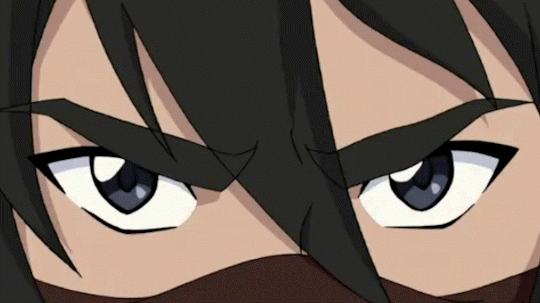
I noticed some unique moments where his pupils narrow like a cats, then I got curious to see if this was consistent, because if the animators have been doing something so subtle from the beginning that would be HARDCORE. This…Is the documentation of my silly quest to see if that was intentional, or if this is all in my head. It’s basically me RE-watching the series, Paying attention to Keith’s eyes, and screenshotting my observations. Plus I get to capture some pretty Keith eyes in the mean time, so it’s a win win. Shall we begin?

“Where…were you?”
Look at those purples! I did lighten the image here to see his pupils better but besides that there was no color tampering. So This is just an image to see his general eyes. There is nothing particularly odd about them in this picture besides the unnatural color.


And just for comparison, here are Allura’s eyes. Shiro and Hunk have relatively round irises, while Pidge and Allura have slightly more oval shaped Irises, they are still both rounder than Keith’s consistently sharpened shape. Lance has pretty smal Irises but when you’re in close enough to see the color, they are also pretty narrow, but still round at the end of the day. Allura’s and Keith’s are the closest in terms of how elongated they are, and the general shape of their eyes + how big their irises are by comparison. So I’m using Allura as something of a control group for my observations today. Now thats established. MOVING ON!

“By myself?” “Minor change pf plans. You’ll be fine. Just remember, patience yields focus…”
So Keith is obviously a bit nervous here. The idea of Shiro splitting with him to help Pidge find the prisoners unsettled him enough to voice his concerns (while he usually keeps his thoughts to himself). His Irises are standard level pointy but his Pupils are sharper and more diamond-like in this shot. This is the first time I noticed any real sort of change in his screen time. This could have been an accident but like…Whatever?

“Great, now which way?”
This shot is right after he stopped to stare at the Galra symbol for awhile. His Pupils have already rounded out but once again, his irises are consistently sharp. That is a character design choice that stands out from the others. As I’ve been watching the episode I have seen some similar oval eyes from Pidge but never this pointed in the Iris department.

*Has just been ejected into space and is afraid*
So it’s find of interesting. Usually in cartoons when a character is scared or surprised their irises get smaller all around, so there is more white of the eye shown. There isn’t a significant difference in size here, his irises still take up most of the length of his eye, BUT they are notably more narrow. His pupils are slightly elongated. Very subtle but it gets the point across in a way that isn’t the first route to showing that emotion in animation. Then of course moments later we get this:

Still sharp and narrow, that the general shrinking of the iris is what i would have expected them to do form the start.
I think the strongest examples though, are when you compare two moments
form the same shot. Example:



“You’re putting the lives of two people over the lives of everyone in the entire galaxy!”


“Oh No. We’ve gotta get to our Lions!”

“Sendak…Wait, has anybody seen Shiro?”

“This is my chance to put an end to the Galra Empire…”

“I have to take it!”

“I know I’m not Shiro, but he’s in trouble. We need to help him.”
Coincidentally. In my entire re-watch of the series, I think this is the roundest I’ve seen his eyes, even though his pupils are still sharp. Likely because they were subtly wanting him to look more like Shiro in this shot since he is about to be all Black Lion status.

“Keith, if I don’t make it out if here…I want you to lead Voltron.”
“BItch EXCUSE you?! You are NOT leaving me AGAIN”
So the first time I thought it might just be a coincidence, but now I’ve seen multiple incidents in which his Irises simply NARROW rather than shrink to express emotion. It doesn’t happen all the time, but usually in close up shots. I haven’t seen that happen for anybody else. At least not to this extent.

“Stop talking like that. You’re gonna make it…”

“Maybe Zarkon found out about this place on his own. He’s probably been searching for the Blade of Marmora”

“Okay! We’re getting out of here. Anybody tries to stop us, and Lubos gets it.”
On a side note, I love how Keith gets so pissed about King Lubos turning on his people that he’s just like “Well I am willing to kill you now.” Nobody messes with Keith, especially when it comes to family. He lost it similarly at Pidge in season 1.

“I’m fine. Just tired.”
Wow. Look at those vulnerable uncertain sad eyes. They really widened them for this shot. even more than his usual resting face. Super round. Nice.

During the nightmare (episode 6)
This is a typical technique to show fear by shrinking the iris. Vur they still emphasized the diamond shape of his eyes while with other characters they have shrunk to small circles or ovals. Point being, the sharp shape of his eyes is very intentional.
I have always thought that Keith’s eyes were one of his biggest expressors and one of the clearest link he has to being Galra in his design. And I just believe that more in season 2 because of all of these shots:
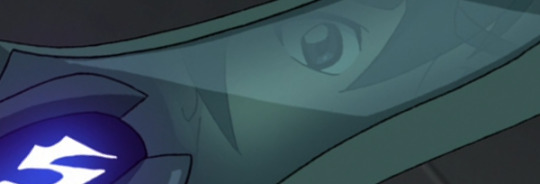
Not only is it dramatic, but as soon as we find out his dagger is Galra, he always see his eyes in it. Not much else about his design hints to his Galra heritage so I would say, yeah, that was probably intentional.

“I would never count on them for help.”
Just throwing this in here because I want to acknowledge Allura’s eyes have done some similar things to Keith’s in this particular scene. Not in narrowness, but in the sharp shape of her Irises. Though it’s notable that she too is an alien.

“Princess, are you okay?”

Opening shot of Episode 8 “That Blade of Marmora”
The episode in which Galra Keith is confirmed OPENS with a shot of his eyes.

“This is the whole reason we came out here! There is no other option!”
Ooooooh look at those sharp pupils!

“You’ll need to control your emotions if you’re going to lead this group someday.”

“I imagine we would. However, I wasn’t referring to your beast.”

“We will meet again.” “Can’t wait…”

“Shiro…?”

“Keith.” “…Dad?”

“She’ll be here soon.”
So Keith’s dad has them too. And assuming he is human, I am truly crazy and looking for something that isn’t there. Either that or they put that in as a subtle design choice to make him look more like Keith so we can indeed say yes this is his dad.
But you know what? I have come this far so I’m gonna finish anyways.
And though I’ve notices a few other sharp and determined eyes in my watch through, Keith’s have been the most consistently narrow and sharp so I STAND BY THAT BEING A DESIGN CHOICE FOR HIM WHETHER IT HAS TO DO WITH HIM BEING GALRA OR NOT.

“If any one of us fails, the entire plan fails.”
Still sharp and narrow pupils even with round eyes. His eyes get a lot more round during his vunerable moments though. His more “human” emotions like insecurity or sadness clash with his firey Galra ones like fierce loyalty and rage. Those at least seem to be how the Galra define themselves through what he we have been presented thus far. “I fight in the name of Galra. Nothing can stop me but triumph or death.”
Once again, assuming this was intentional. I could also be reading too much into things but I’ve put enough time into this by now tha tI don’t really care if it’s wrong. Still gonna headcanon it ;)
But most of all this is just a really pretty Keith shot.
OKAY HERE WE GO, THIS IS THE MOMENT THAT CONVINCED ME TO RE-WATCH THE ENTIRE SERIES TO BEGIN WITH.

Here are some round, curious irises as Keith helps the unidentified lifeform from the ship inside the Weblum.

Narrowing as he realizes the lifeform has the Galra insignia on their armor.

”You’re Galra.”
Um, I dunno if you’ve forgotten Keith, but SO ARE YOU! LOOK AT THOSE EYES!

CLOSE UP and color tampered for better view. Look how narrow and shark. He looks like a snake or a cat in this shot. Even if everything else I’ve screenshot has been grasping at straws I am CONVINCED this is intentional. Just watching the frames as a whole and watching that change happen? It’s to blatant to not be pointing out that Keith is Galra, even as he’s not trusting somebody else for being.

But just a moment later he blinks them away, confused and distracted by the sounds of the Creatures inside the Weblum. UGH So good.

“We’re Paladins of Voltron. We can’t just leave people to die, even if they are Galra.”
Keith’s eyes are sincere here, and perhaps a little humbled. He passed judgement back there in the blink of an eye and probably realized how hypocritical that was. Funny how it’s the HUMAN side of his that is going ot have to learn to accept the Galra. And that part of himself. AAAAAAAAH. I love this show. “I think turning Galra has made you a better human.” Lol.
Okay just a few more pretty eyes then I’ll be done with this post forever. If you read all the way to this point like…congrats? It’s long? I didn’t expect anybody ot actually read it since it’s just an awkward documentation of me obsession over Keith but like…yeah.

“Oh, good timing, Lance!”
This is directly after Keith has been telling Hunk what to do to avoid/distract the beast in episode 10. Hunk tells him to “stop back-lion-driving” despite the fact he’s listening to him. Then Keith shuts up, Lance shows up being all hero-like, and Hunk acknowledges him. Even without the zoom I’ve provided, the emphasis is on Keith in this shot, despite Hunk being the one who is talking. The storyboard artist wanted us to notice Keith’s face.
I know its off topic, but I think Keith’s biggest issue when he becomes the leader is going to be 1) coming to terms with the fact he is not and can’t be Shiro. He needs to be his own leader, not imitate their previous one. 2) The others aren’t going to want to listen to him, despite the fact that it was his instructions that were keeping them form getting hit. Even if Hunk didn’t need them, after Keith shuts up, Lance fails in distracting the Beast and the Yellow lion gets hit. It’s subtle, but they put that there for a reason. Even when Keith IS displaying proper leadership qualities, he kinda has a bad rep, and it’s gonna be a struggle to take over when Shiro is gone.
OFF TOPIC BUT KEITH’S EYES YAY

“No one’s commanding me. I’m doing it.”

“Please come back to us.” “I will.”

“It was an honor…to meet you.”

“I’m all in.”
Aaaaand thats all. Thank you for coming on this silly little journey with me.
113 notes
·
View notes
Text
Bon Jovi rocks... on occasion...
I found it REALLY odd and jarring that, while testing Dean’s memory in the motel room after the LAMP incident, that Sam chose BON JOVI, of ALL bands, to see if Dean could remember the band members’ names.
I mean??? We know for a fact from 4.18 that Dean’s two favorite songs were both by Led Zeppelin. My first thought was confusion over why Sam didn’t ask him to name the members of Led Zeppelin, because that would’ve been the obvious choice here... but no. He picked Bon Jovi.
And that told me something SIGNIFICANT. And I’ll explain why.
Bon Jovi has been referenced in a small handful of episodes.
2.14, Born Under A Bad Sign
The first Bon Jovi reference in the series was this:
Dean: You checked in two days ago under the name Richard Sambora. Of course, I think the scariest part about this whole thing is the fact that you're a Bon Jovi fan.
The name Sam used while he was possessed by Meg and had no memory or awareness of what he’d done, was a member of Bon Jovi. 12.11 reminded me strongly of Dean trying to help Sam recover his memories by revisiting the places he went while possessed. Sam did the same thing for Dean in 12.11.
Their conversation with Elke STRONGLY reminded me of Dean’s conversation with the gas station market cashier. WHO EXAGGERATED WHAT SAM APPARENTLY STOLE TO GET MORE MONEY OUT OF DEAN. Like Elke exaggerated her story to Sam trying to elicit SOME sort of reaction out of Dean.
So we already have a connection to memory loss, deception, attempting to recover memories that have been manipulated or altered by outside forces.
3.16, No Rest For The Wicked
While driving to make one last attempt to stop Lilith and save Dean from going to Hell, Bon Jovi’s “Dead or Alive” plays on the radio. Sam and Dean sing along to it. Sam gets into it, and Dean looks like he’s already dead inside.
(aside to say that the face Dean makes while singing it reminded me STRONGLY of the face at the end of 7.11 when he was trying to use Frank’s advice to paste on a smile and be “professional” or just give up. In other words, the most horrible smile in the history of smiles)
Because even in that episode, Sam seemed surprised:
DEAN: You know what I do want?
[He reaches down to the radio and starts up Bon Jovi's "Wanted Dead or Alive". SAM looks a bit "eeh?"]
SAM: Bon Jovi?
DEAN: Bon Jovi rocks, on occasion.
He looks over at SAM to underline this statement. When SAM looks away DEAN turns back to the road and begins to sing along with Bon Jovi.
[...]
[DEAN begins to lose the will to sing and his smile is beginning to fade. SAM just continues to sing, laugh and smile, not noticing how DEAN is suddenly taking in the lyrics, realizing how much they actually fit him and what is about to come. The camera zooms on him as his smile completely vanishes, as he's staring out on the road.]
DEAN WAS NEVER THE BON JOVI FAN. THE BON JOVI FAN WAS SAM. They were driving to Dean’s likely death and a one-way ticket to Hell, AND THIS WAS DEAN TRYING TO PUT ON A BRAVE FACE AND DISTRACT SAM WITH SOMETHING THAT SAM LOVED.
This was Performing Dean trying like hell to keep that mask in place for Sam’s sake.
7.05, Shut Up, Dr. Phil
Once again, it’s Sam who chooses the alias “Agent Sambora.” We never learn what Dean’s FBI alias was in that episode. Dean wasn’t even WITH Sam during the conversation where Sam used the alias. Dean was busy having a chat with Chris the Hairdresser (played by the same guy who played Akobel in 12.10).
After those two separate respective interviews, Sam and Dean are shown walking down different streets while swapping info over the phone about what they each learned independently.
Aside again, because I love this exchange Dean has with Chris in the salon:
DEAN: Oh. Basically, you're saying that this couldn't have happened.
CHRIS: Basically, I'm saying it couldn't have happened.
While standing there looking at the physical proof that yes, it did actually happen.
DEAN: [...] Of course, they don't have pockets in those robe thingies that they make you wear.
SAM (on phone): [laughs] I didn't realize you were such a spa expert.
DEAN (on phone): Shut up. I observe with my eyes.
Again, Dean floundering to keep up his performance while Sam teases him for knowing that spa robes don’t have pockets... >.>
Dean might observe with his eyes, but he’s prevented Sam from seeing a lot of things over the years with that heavy-duty Performance mask.
Plus, 7.05 was all about witchcraft, deception, and misunderstandings. Remember poor Jenny? Who’d been hexed into finding hearts in her cupcakes? HEARTS?! IN MY CUPCAKES?! Because Maggie thought her husband was having an affair with her? Sam and Dean thought so at first too, but Jenny cleared that misunderstanding up:
JENNY: Don Stark is my boss. That's it. He's married, for God sakes.
DEAN: Yeah, well...
JENNY: Me and Don Stark. Ew.
8.03, Heartache
It’s again SAM who uses the alias Agent Sambora. In an episode about loss of identity via transplanted organs asserting the personality of their original owner on the recipients, DUE TO THE EFFECTS OF AN ANCIENT CURSE.
After his long, long life, not wanting to live on after his true love eventually died of old age, a woman who was already old enough to pass as his mother, Brick chose to end his own life instead. After generations of being forced to reinvent himself every few decades and essentially reinvent himself because he didn’t age or die...
But then the recipients of his organs inherit his curse and lose themselves to his identity.
Loss of identity was huge in 12.11.
And again in 8.03, we never learn what alias Dean was using while Sam again chose a Bon Jovi reference.
11.11, Into the Mystic
Dean muses on how nice the retirement home is, mentioning that maybe they should look into it, and again IT’S SAM WHO BRINGS UP BON JOVI:
Dean: So no retirement, huh?
Sam: Hey, you're the one who's always wanted to go out 'blaze of glory' style, preferably while the Bon Jovi song is playing.
Dean: I am a candle in the wind.
“Blaze of Glory” is a Bon Jovi song, and “I am a candle in the wind” is one of the lines from the first verse.
But this is all part of Dean’s “I’ll die hunting” refrain that we’ve been seeing again in s12. Because Dean just believes he’ll go out that way. Because every hunter he’s ever know does go out that way.
All this in an episode where Cas has been taken over by Lucifer, and Dean’s REALLY unsettled that there’s something wrong with Cas. He’s being deceived, manipulated, and used as bait, yet he doesn’t even know it. He’s just got a weird feeling at this point.
It’s the “something’s wrong and I can’t put my finger on it” feeling that keeps hunters alive, frankly.
Then we have Dean’s entire conversation with Mildred about finding happiness and following your heart:
DEAN [Chuckles]: You ever miss life on the road?
MILDRED: Nah. Nah, I had my fun. You want to know the secret to living a long and happy life?
DEAN: Actually, yes, I do.
MILDRED [Placing her hand on Dean’s chest and patting it] Follow your heart. You do that, all the rest just figures itself out. I did that. I followed my heart. Traveled the world, made people smile, forget about their problems for a while. And then my heart said, “Well, you're done”. I had my fill and... And I retired. And I love it. [Mildred pats Dean’s knee for emphasis]
Which is doubly interesting when compared with Sam and Dean’s lines at the very end of 12.12:
SAM: You know, I gotta be honest. I was actually, ah, a little jealous at first.
DEAN: Of what, the curse that nearly killed me?
SAM: No, just... you know. Some of the things we’ve done. We’ve had this... weight. Forever. And seeing it gone... you looked happy.
DEAN: [he looks down, doesn’t meet Sam’s eyes, and seems uncomfortable] Huh. Well, look, was it nice to drop our baggage. [he shrugs and looks up at Sam] Yeah, maybe. Hell, probably. But it wasn’t just the crap that got lost. I mean, everything. It was us it was what we do, you know. All of it. So... if that’s what being happy looks like... I think I’ll pass.
BECAUSE WE KNOW THAT DEAN ALREADY KNOWS THE SECRET TO A LONG AND HAPPY LIFE IS TO FOLLOW YOUR HEART. And without his memories? That’s not happiness. That’s delusion. It’s a lie.
A performance.
12.04, American Nightmare
This wasn’t a direct Bon Jovi reference, but I wrote a thing trying to explain the difference between the “Butt Rock” that Sam has always been a fan of, that Dean was so disdainful of when they were talking about Vince Vincente.
http://mittensmorgul.tumblr.com/post/154601623940/brainfuzz-mittensmorgul
Even the Superwiki pointed this out in the reference notes for the episode:
It can be assumed with Sam being a fan of Bon Jovi and Vince Vincente, that his musical tastes veered more towards '80s hair/glam metal growing up, which is in contrast to Dean and John's classic hard rock and heavy metal tastes.
BECAUSE BON JOVI ONLY ROCKS ON OCCASION. I think Dean grudgingly liked a couple of their songs.
BON JOVI IS NOT DEAN’S KIND OF MUSIC. IT’S SAM’S. WHICH DEAN HAS SUFFERINGLY TOLERATED FOR SAM’S SAKE. FOR YEARS. Because Dean knows Sam FAR better than Sam knows Dean.
Lizbob wrote a thing yesterday before 12.11 aired that said that this was going to be something KEY to this episode, this disconnect between the brothers, and the fact that Dean has functioned as a pseudo-parent to Sam.
http://mittensmorgul.tumblr.com/post/157037949755/i-cant-wait-for-dean-to-enter-the-amnesia-phase
And my absolute rant of a post about the promo:
http://mittensmorgul.tumblr.com/post/156996781305/oh-god-sorry-but-thats-a-clusterfuck-of-promo
Because that’s pretty much how the episode panned out.
An exposition on Performing Dean.
#spn s12 spoilers#spn 12.11#performing dean#sanitized for sammy#the story became the story#spn 2.14#spn 3.16#spn 7.05#spn 8.03#spn 11.11#spn 12.04#the rashomon effect#here have my belated thoughts on the whole love... and love#parallels#spn music
131 notes
·
View notes
Text
The Raven Boys

Synopsis:
"'There are only two reasons a non-seer would see a spirit on St. Mark's Eve,' Neeve said. 'Either you're his true love...or you killed him.'"
It is freezing in the churchyard, even before the dead arrive.
Every year, Blue Sargent stands next to her clairvoyant mother as the soon-to-be dead walk past. Blue herself never sees them — not until this year, when a boy emerges from the dark and speaks directly to her.
His name is Gansey, and Blue soon discovers that he is a rich student at Aglionby, the local private school. Blue has a policy of staying away from Aglionby boys. Known as Raven Boys, they can only mean trouble.
But Blue is drawn to Gansey, in a way she can't entirely explain. He has it all — family money, good looks, devoted friends — but he's looking for much more than that. He is on a quest that has encompassed three other Raven Boys: Adam, the scholarship student who resents all the privilege around him; Ronan, the fierce soul who ranges from anger to despair; and Noah, the taciturn watcher of the four, who notices many things but says very little.
For as long as she can remember, Blue has been warned that she will cause her true love to die. She never thought this would be a problem. But now, as her life becomes caught up in the strange and sinister world of the Raven Boys, she's not so sure anymore.
From Maggie Stiefvater, the bestselling and acclaimed author of the Shiver trilogy and The Scorpio Races, comes a spellbinding new series where the inevitability of death and the nature of love lead us to a place we've never been before.
Title: The Raven Boys
Series: The Raven Cycle
Author: Maggie Stiefvater
ISBN: 0545424933 (ISBN13: 9780545424936)
Pages: 408 pages (Paperback)
Published: July 30th 2013 by Scholastic Inc. (first published September 18th 2012)
Characters: Blue Sargent, Richard "Dick" Campbell Gansey III, Adam Parrish, Ronan Lynch, Noah (The Raven Cycle)
Setting: Henrietta, Virginia (United States)
Genre: Young Adult, Fantasy, Romance, Paranormal, Magic
First off let me address the things that I was expecting this book to be all about:
Poor girl meets rich boy and falls in love (kind of a forbidden love trope)
Insta-love ( I mean the description straight up says he’s her true love before they meet)
A very plot-centered romance overall
Yes, the description made me think this book was all about true love, kissing, and romance.
But….
It most certainly is the opposite.
This book is in fact more about psychics, spirits, ley lines, magical trees, and the search for an ancient Welsh king who waits to be woken. Now doesn’t all of that sound so much more appealing than the kissing? I know I found it to be, I couldn’t resist turning pages to find out what would happen with all of these things next! Maggie Stiefvater intricately weaves the paranormal with the fantastical, sure there are supernatural things happening but yet you still get the very distinct impression of magic. How could you not love a blending of the paranormal and the magical?
The atmosphere that was created, it was eerie and also suspenseful, I loved everything from Blue’s family demonstrating their psychic abilities to Gansey and boy’s quest for Glendower (you know…that ancient Welsh king I mentioned earlier). There are definitely a lot of things happening within the plot of this book, lots of different plot lines to be followed. It may come off confusing right away to some people but the mystery and anticipation is half the fun, trust me! There is also a bit of POV jumping, which I know can confuse some readers or at least annoy, so you’ve been warned about that now.
As far as all of the romance goes though there still is some but it really does take a backseat in the story which I appreciated very much. However, I don’t think any of you romance fans will be too disappointed with it. It’s a very slow-burn romance and it doesn’t completely take over the plot and the romance isn’t exactly between the characters you would expect…..
The pacing did get a little slow at times and it would really go up and down a lot, however, I didn’t mind since my thirst for answers concerning our many plot lines far out-weighed any slow pacing.
Overall I think my favorite part about this story and its plot is how original it feels, which is something I wasn’t expecting at all. I was actually expecting a book full of the same old tropes but I have definitely never read or heard of anything like this before.
Honestly I think the characters are the best part of this whole book, the story is kind of character driven overall. There wasn’t a single character I disliked which is quite the feat on its own. Everyone is complex, developed, and interesting. Emphasis on the interesting. They’re also all very likable in general but most of all they’re realistic.
Blue Sargent is one of our MCs don’t let the description fool you into thinking this is a 1st Person POV told only by Blue because it isn’t. Blue and The Raven Boys themselves are on equal footing as far as the POVs go. I digress, I actually really liked Blue’s character she’s sensible (as she so often calls herself) and quirky and she doesn’t really take shit from anybody. Qualities I love in a heroine. She’s also a kind of the opposite of a special snowflake seeing as how she’s the only member of her family that doesn’t have psychic abilities which I like because it makes her just a bit more relatable as a character. However, Blue does make things “louder” for other psychics but I still don’t view this as special snowflake status.
Then we have our Raven Boys and they really are the stars of the show in my opinion and Blue pales in comparison, I could sit and sing their praises all damn day. Gansey, Adam, Ronan, and Noah are just complete and utter perfection as far as characters go; they’re flawed, complex, and actually quite….swoon-worthy. I also really love how strong their friendship is and how realistically it’s portrayed. It’s also a nice change of pace to have interesting male main characters in a YA book.
Gansey is very determined in his quest for Glendower and he’s clever and a loyal friend. He’s also not my favorite character I just found something a little lacking with him, don’t get me wrong he’s still a great character and I like him but he just isn’t my favorite. Something just didn’t quite spark my interest enough with Gansey’s character.
Adam makes me heart bleed, I came close to tears every time we switched to his POV. He’s got the whole “rags to riches” thing going on but it doesn’t come without its costs and he’s had to work very hard to get where he’s at. Honestly I just wanted to give him a hug the whole time and he deserves one!
Ronan is by far my favorite character he’s the “bad boy” and I feel cliched for having him be my favorite but he’s so awesome I don’t even care. There’s actually a lot going on with Ronan and he has his fair share of secrets that keeps his character intriguing. Plus everyone loves a sarcastic little shit, right?
Noah is probably one of the single most adorable characters I’ve ever come across in a book, he puts fluffy kittens to shame. He’s quiet and very much in the background but that doesn’t make him any less important. I think the most significant thing I can even say about Noah is that he’s adorable, seriously that’s probably all you need to know.
There are also many secondary characters that are equally complex and play equally important parts in the plot. Mostly Blue’s family. They’re just as quirky and eccentric as Blue and they’re just overall a fun set of characters. Blue’s mom is definitely one of my favorite literary mothers of all time now.
The Raven Boys is a great, original tale that blends the paranormal with the mystical and has amazing characters that are easy to connect with.
I’m giving this a rating of 4.5 because I don’t quite feel it’s a full 5 star book but I’m also giving it that extra 0.5 star just because I can’t stop thinking about this book!
Overall I can say that the hype was worth it and I’m so glad to have finally read it.
3 notes
·
View notes
Link

Rep. Karen Bass (D-CA) speaks as other House Democrats look on during an event on police reform on June 25, 2020, at the US Capitol in Washington, DC. | Alex Wong/Getty Images
It’s not expected to go anywhere in the Senate, however.
The House on Thursday passed Democrats’ police reform bill, the George Floyd Justice in Policing Act of 2020, by a 236-181 vote. Three Republicans joined Democrats to vote in favor of the bill, which now heads to the Senate, where it isn’t expected to get much traction.
Thursday’s vote underscores an ongoing stalemate: Over the past few weeks, congressional Democrats and Republicans have been at an impasse over the next steps on police reform, with each party respectively introducing its own bill. Senate Democrats rejected Republicans’ proposal, the Justice Act, earlier this week, on the grounds that it wasn’t expansive enough in its policies. And Republicans are now poised to stall Democrats’ offering in the upper chamber, meaning progress on these reforms is effectively at a standstill.
The two parties’ bills have some similarities: Both would ramp up the use of body cameras, make lynching a federal crime, and incentivize state and local police departments to ban the use of chokeholds. But the Democrats’ bill, led by Rep. Karen Bass (D-CA), who chairs the Congressional Black Caucus, is more expansive than Republicans’.
It would curb “qualified immunity,” a legal provision that shields police from accountability for misconduct, and impose a ban on both chokeholds and no-knock warrants in drug cases at the federal level. Meanwhile, Republicans’ legislation, led by Sen. Tim Scott (R-SC), would not address qualified immunity and does not include a federal chokehold ban.
Democrats have argued that Republicans’ bill centers too heavily on data collection and not enough on legal changes that would directly address police misconduct and use of force. Republicans, however, have said that “qualified immunity” is an area they aren’t particularly interested in tackling. Neither bill, meanwhile, goes as far as what protesters have called for: Both shy away from the idea of “defunding the police” and shifting money from law enforcement budgets to social services.
“When we pass this bill, the Senate will have a choice,” House Speaker Nancy Pelosi said Thursday at a press event about the legislation.
But Senate Majority Leader Mitch McConnell has already signaled that he’s not likely to take up the legislation, and President Donald Trump recently indicated he’d veto the bill if it passed both chambers. “They want to take away a lot of the strength from our police and from law enforcement generally, and we can’t live with it. We can’t live with it,” Trump said Wednesday.
The main question now is whether Democrats and Republicans will ultimately be able to navigate the key differences in their proposals to arrive at a compromise. While there’s plenty of public pressure and interest in implementing reforms, lawmakers’ disagreements could well prevent a measure from coming to fruition in the near term.
What’s in Democrats’ police reform bill
The Justice in Policing Act is a wide-ranging bill that attempts to get at the problem of police brutality toward Black Americans through a number of different means. It has some overlap with Republicans’ proposals — including an emphasis on ramping up the use of body cameras — but goes much farther in provisions concerning legal accountability for police misconduct.
For example, one tenet of the bill would change the law to make it easier to prosecute police officers who harm or kill someone, as well as those who are charged with other forms of misconduct. Other measures include mandatory racial bias training at the federal level and the establishment of a national registry to track police misconduct, plus a requirement for the US attorney general to create new standards for law enforcement accreditation.
Here are some of the bill’s key parts:
Revising federal law on criminal police misconduct and qualified immunity reform: The new bill would change one very significant word in federal law when it comes to prosecuting police: “willful.” That word means prosecutors charging police have to demonstrate there was willful intent on the part of the police officer to kill or harm someone — which can be extremely difficult to prove and successfully prosecute. The bill would change that word to the phrase “knowingly or with reckless disregard.” It would also define a “death resulting” as any act that was a “substantial factor contributing to the death” of an individual.
In addition, the bill changes something called qualified immunity, which courts have interpreted to give police officers and other public officials broad immunity from being sued in civil court if they have violated the constitutional rights of an individual. The bill would make it easier for plaintiffs to recover damages against police officers if the officer is sued and found guilty.
“Qualified immunity is something that has evolved over time. It’s not written into any law,” Sen. Cory Booker (D-NJ) previously told NPR’s Weekend Edition. “But our highest courts in the land have decided that police officers are immune from civil cases unless there’s been specifically in the past a case of generally the exact circumstances that has led towards a successful action. It creates this bar towards civil action against a police officer for violating your civil rights.”
Ban no-knock warrants in drug cases at the federal level: The use of a no-knock search warrant in Louisville on March 13 had fatal consequences. Police shot and killed 26-year-old Breonna Taylor after using a battering ram to break down her door and exchanging fire with Taylor’s boyfriend. The police were executing a search warrant for a drug case, pursuing two other men, but broke down Taylor’s door because they believed the men were receiving packages at her apartment. The Democratic bill would ban these kinds of no-knock warrants in federal drug cases, but also condition federal funding for state and local law enforcement agencies on prohibiting their use as well. Republicans’ bill would commission a study of the use of no-knock warrants, but stop short of a ban.
Ban chokeholds at the federal level: In 2014, Eric Garner was killed by New York police, who used a chokehold to restrain him during an arrest. And in May, Floyd died after a police officer placed his knee on Floyd’s neck for more than eight minutes.
The legislation would put a federal ban in place on the use of police chokeholds, which is defined by the bill as an act putting pressure on an individual’s throat or windpipe that impedes their ability to breathe. Such bans have already been supported by localities across the country including, most recently, Minneapolis.
A federal chokehold ban would further condemn the use of this tactic by police and give the Justice Department more power to levy charges against law enforcement officers who use this maneuver. Activists have raised questions about the efficacy of such bans: Despite the New York Police Department banning chokeholds in 1993, police using the method killed Eric Garner in 2014. Both the Democrat and Republican bills condition federal funding on state and local departments adopting such bans.
Establish a national registry of misconduct by law enforcement officers: There’s currently very little data available about police misconduct, making it difficult to pin down past offenders and ensure that they don’t receive jobs in new places. According to a USA Today report, punishment for misconduct also varies at the state level, with some requiring police to decertify while others are far less punitive. Creating a national registry about misconduct would enable lawmakers to better understand its frequency and craft targeted responses to combat it.
The Republican bill would not establish a national registry of police misconduct but does require local and state agencies to maintain disciplinary records for law enforcement officers; it also conditions funding on these practices.
Require states to report use of force to the Justice Department: Similarly, little is currently known about the frequency with which police officers currently use force, something the bill is striving to change. By mandating state documentation of use of force, law enforcement agencies can begin to determine how often police engage in such actions. The Republican measure, too, calls for state and local agencies to report use of force to the federal government on an annual basis.
Mandate racial bias training at the federal level: A reform that’s been implemented in some police stations across the country, racial bias training is aimed at getting law enforcement officers to recognize their own explicit and implicit biases — and how these attitudes affect the way they respond in different situations. Researchers have found implicit racial biases could be tied to officers being quicker to shoot black subjects versus white subjects. The training involves providing officers with evidence of these biases playing out so they are forced to recognize their existence.
In addition to requiring it at the federal level, the bill would condition funding for state and local police based on their commitment to implementing racial bias training programs. Among critics of racial bias training, questions remain about how effective it is in deterring police abuses and disparate use of force.
Require that deadly force be used only as last resort: The bill would change the use-of-force standard for federal officers from “reasonableness” to only when it is necessary to either prevent death or “serious bodily injury.” It would require federal officers to use deescalation techniques and only resort to force as a last resort, and would condition federal funds to state and local agencies on their adoption of the same standard.
Make lynching a federal crime: The killings of Floyd and Ahmaud Arbery, a black jogger who was shot by two white men in Georgia while he was out on a run, have been described as modern-day lynchings. Despite more than 200 attempts to consider bills addressing such acts, there remains no law on the books classifying lynchings as a federal crime.
While the House and Senate have respectively passed their own legislation that would do so, the two have yet to approve one bill and get it signed into law. Both the Democratic and Republican bills would guarantee that lynching — described by House Majority Leader Steny Hoyer as “the premeditated, extrajudicial killing by a mob or group of people to instill fear” — would be treated as a federal crime. The Justice in Policing Act would also classify conspiring to commit civil rights offenses, such as a hate crime, as a lynching.
Require police to use more body and dashboard cameras: The bill would require federal police officers to wear body cameras and put dashboard cameras on all federal police vehicles. It requires state and local departments to use existing federal funds to increase body camera use, which has been on the rise since the 2014 shooting death of Michael Brown in Ferguson, Missouri. However, research has shown that more cameras aren’t the whole story; police don’t always turn them on or review the footage while writing an incident report, and footage is not always made public.
The Republican bill also encourages the use of body cameras and establishes a grant program for police to obtain such technology.
Limit the transfer of military equipment to local police departments: Currently, the military is able to distribute excess equipment including armored vehicles and ammunition to local law enforcement agencies under the 1033 program. The bill would prohibit the distribution of some “controlled” military equipment by the Department of Defense, such as firearms, grenades, vehicles, and weaponized drones. There are scenarios when departments could waive this rule, however, such as when police need a vehicle for a natural disaster response.
The next steps for police reform are uncertain
Given the differences in the Democratic and Republican proposals, the next steps for police reform remain uncertain. In a letter to McConnell earlier this week, Democrats called for Republicans to engage in negotiations before holding another floor vote.
“This bill is not salvageable and we need bipartisan talks to get to a constructive starting point,” wrote Senate Minority Leader Chuck Schumer (D-NY), Sen. Kamala Harris (D-CA), and Booker. McConnell, too, has said a Senate bill has the potential to come up for another vote later down the line.
Whether such talks will lead to tangible progress, however, is an open question. Because both Democrats and Republicans view “qualified immunity” as a key sticking point, it’s possible any compromise could stall over this — and other — provisions.
A similar dynamic has played out in the past over other policy areas: Prior efforts at gun reform, which had significant public support, have been stymied by partisan differences. After the mass shooting at Marjory Stoneman Douglas High School in Parkland, Florida, in 2018, Democrats and Republicans proposed multiple gun reform bills regarding background checks and “red flag” laws, many of which foundered.
Additionally, as Fox News’s Chad Pergram notes, Democrats may be interested in waiting for the outcome of this fall’s elections: If the party is able to retake a Senate majority, it could have added leverage to advance a more comprehensive set of police reforms at that time.
Support Vox’s explanatory journalism
Every day at Vox, we aim to answer your most important questions and provide you, and our audience around the world, with information that has the power to save lives. Our mission has never been more vital than it is in this moment: to empower you through understanding. Vox’s work is reaching more people than ever, but our distinctive brand of explanatory journalism takes resources — particularly during a pandemic and an economic downturn. Your financial contribution will not constitute a donation, but it will enable our staff to continue to offer free articles, videos, and podcasts at the quality and volume that this moment requires. Please consider making a contribution to Vox today.
from Vox - All https://ift.tt/2NwzHRq
0 notes
Text
Probate Lawyer Morgan Utah
The law of inheritance in the United States is complex. It’s not as simple as it appears. In Morgan Utah, you should have the help of an experienced estate and probate lawyer.
In the United States, the surviving spouse receives greater protection in inheritance schemes than any other family member. In fact, in almost all states including Utah the surviving spouse is the only family member who consistently receives significant protection from intentional disinheritance by the decedent. In part the spouse’s favored position is historical. Americans long viewed the spousal relationship as the most important in life—a view the United States Supreme Court emphasized during the nineteenth century. Of course, the importance of marriage sometimes had little to do with romantic or spiritual union. Rather, marriage was often a practical imperative for women given the socially and legally enforced dependence of women on men and restrictive views of both gender roles and family life. Yet the spouse’s preferred position in probate law is not merely a relic.
youtube
The law’s insistence on formality was more effective than one might expect, because the will was also, in many ways, a popular as well as a formal document. The general idea, the ways of expressing the idea, even the language itself, seem deeply rooted in custom. In the early seventeenth century, among the first settlers in what is now the United States, and at a time when there were no lawyers to speak of practicing, colonial records show that people knew about wills, that executing a will was the custom, and that people roughly understood how a will should be framed.
These wills often used standard clauses, and also vaguely poetic singsong phrases, clearly based on folk memories. Most legal documents have very little poetry about them. As literature, they are pretty close to absolute zero: consider the typical insurance policy or the impenetrable jungle of jargon in the Internal Revenue Code. And a lawyers opinion letter, as a rule, tends to be written in leaden, cautious prose.
The typical will, too, has always been full of jargon. Yet its customary language was not just legal blather. And for all their technicality, wills were never as dry and pedantic as, say, the typical insurance policy. The will, after all, was an instrument of giving, of love, often, too, it was an instrument written in the shadow of death. Traditional wills were full of traditional, half-mystical phrases.
Witnesses
Under Utah law, a will must have at least two witnesses for it to be valid. The two witnesses had to see the testator sign the will. The witnesses were also supposed to be in each other’s presence when the testator signed or acknowledged the will.
Many courts were quite sticky and insisted on strict, literal compliance with these rules. The modern trend is to relax some of these requirements, and courts today might well reach different results in some of these cases. There has been a definite movement away from “formalism.”
In this age of computers, satellites, and trips into space, there does seem something a bit archaic about the will. It is, after all, a written document, requiring an actual signature (and, for the most part, the signature of witnesses). There has been talk about videotaped wills; but no state recognizes any such thing. A videotape may be “admissible as evidence” of the “proper execution of a will,” the intentions of the testator, the “mental state or capacity of a testator,” the “authenticity of a will,” and other “matters” a court finds “relevant to the probate of a will.” But the will itself cannot be videotaped.
Revoking a Will
A will is “ambulatory,” as the phrase goes. It is a formal, legal document; but does not become effective or enforceable as long as the testator is alive. It becomes effective only on the death of the testator. During his lifetime, the testator is free to do whatever he pleases with the will – he can retain it the way it is, he can change it, he can destroy it. No questions asked. It’s his will and he can do whatever he wants with it. Legally speaking there are two main ways to revoke a will. The most common way is to make another will with a clause that specifically states that the testator is revoking all of his previous wills. If you want to revoke a will and make a new one, speak to an experienced Morgan Utah probate lawyer.
youtube
The second method of revoking a will is even simpler. You can revoke a will by killing it physically. Just shred it but make sure there are no copies of the will. The destruction, however, has to be deliberate: if the house burns down and the will burns with it, it has not been revoked, and if you can prove what was in the will, you can still have it probated. A lost or destroyed will can, then, have a kind of life after death. Still, on the whole, the law places great emphasis, almost mystical emphasis, on the will itself, and its signatures. And on the original will. This is the important document—not a photocopy or the like. The will has a kind of magic. You can get rid of it only with another magic document, or by actually putting it physically to death.
Destroying a will, then, was something like killing a vampire: the stake had to go through the vampire’s heart; nothing less would do. Generally speaking, the law has stood firm on one crucial point. The law will not take into account the mere fact that a will is old, out-dated, and doesn’t seem to fit the testator’s present situation or conform to his later wishes. The message is plain: if your situation changes, then change your will. Otherwise, the old will stands.
Contesting a Will
If you want to contest a will, speak to an experienced Morgan Utah probate lawyer. There are some valid grounds on which you can contest a will in Morgan Utah.
The main reason that will contests are rare is quite simple: most wills seem fair and just. A widow dies, survived by three children, and she leaves her money to the three, in equal shares. Her money goes to those whom the law calls the “natural objects of her bounty.” Nobody has any reason to object; and nobody does.
For wills that can be contested, there are some huge hurdles. One is social. Even if daddy’s will was unfair, bringing a lawsuit might cause bitterness and alienate the rest of the family. No doubt thousands of families do disintegrate because of anger and disappointment that pivots on inheritance. But probably most families survive. Cost is another hurdle. A will contest can be expensive; and the risks are high. A third hurdle is the law itself. It puts many obstacles in the path of those who might want to contest.
youtube
Fraud is another basis for contesting a will. But this too is a rare claim, and rarely successful. The books and the cases talk about “fraud in the inducement,” and “fraud in the execution.” Fraud in the inducement means “willfully false statements of fact,” which are “intended to deceive testator, which do deceive him, which induce him to make a will, and without which he would not have made such a will.” Lies about the will itself—the document—which induce the testator to “execute an instrument of whose nature or contents he is ignorant,” constitute fraud in the execution. The cases on “fraud” often involve old, feeble people. Some of them seem really to be cases of undue influence, or lack of competency.
Disappointed relatives attack the will, claiming that somebody (a housekeeper, a relative, a neighbor, a trophy wife, a girlfriend, or a gay lover) took advantage of Grandma or Grandpa and inveigled him or her into leaving money to the undue influencer. Many of the cases are about “unnatural” wills (wills that disinherit close relatives); undue influence is “presumed,” too, if the alleged Svengali stood in a “confidential relationship” to the deceased. So, if a person suddenly cuts off his relatives and leaves almost everything to his doctor, lawyer, priest, guardian, or the like, the will may be in trouble. The influence, of course, has to be “undue.” If an old man executes a will leaving all his money to his housekeeper, who is in the room hectoring and badgering him, that situation will seem exceedingly suspicious to a court. But if it’s his wife in the room hectoring and badgering, and he leaves her everything, this is much less likely to be considered “undue” influence. It is influence of course, but not “undue.”
There are exceptions, to be sure. This general statement, about wives and their influence, does not hold quite so true for second wives, especially if the will disinherits the children from a former marriage. Sometimes it is the widow who complains of undue influence. Stepchildren do not hesitate to sue a stepmother; but there have even been instances where children accused their own mother of undue influence. Much more common are cases where the battle is between brothers and sisters. An “unnatural” will may be dangerous, but so is a lopsided will, leaving more money to one child than to another.
The layman often imagines that the world of the law consists of clear, binding, and unambiguous rules. In fact, the legal system is riddled with loopholes and leeways of all sorts, some explicit, some implicit. Undue influence is only one of many devices that give courts (and juries) a little bit of wiggle room. The good news is flexibility; the bad news is that the doctrines are applied sporadically, and somewhat irrationally. Whether a court actually finds undue influence depends on the facts of each case—plus social norms and the courts own prejudices and opinions. The cases thus are very dependent on time and place.
The law of wills is surely still too rigid. There are too many formalities. The whole process of “probating an estate” is still too bureaucratic and complex. Most countries seem to manage to transfer enormous sums from generation to generation without the fuss and formality of American law. But American law is moving in the direction of greater simplicity and flexibility. The spread of the holographic will is one example.
One important development has been the (partial) dethronement of the last will and testament. This document is no longer the centerpiece of succession. It has powerful rivals. People have alternatives—will substitutes. These have become more and more popular, for rich and poor alike. The Totten trust is flourishing. This is within the reach of anybody with a bank account. Estate planners are vigorously, and successfully, peddling “living trusts,” which bypass the probate court.
There are, in short, alternative ways of disposing of one’s earthly goods. Of course, the will remains important. And it remains, in most regards, still rather rigid and formal; but less than it was. The change may be in part because of a general decline in “formalism.” But it also reflects the rise of will substitutes, which are much less formal. Also, wills no longer seem to be vital documents of title, especially title to land. Land is less important in the economy than it was; and in any event, we have other, better ways to guarantee title and clear up ownership. In the future then, wills may become even less formal. The courts may go further in excusing mistakes. And we might get to see electronic wills, on-line wills, or video wills. The definition of “family” has also changed. Millions of couples live together without getting married. Some of these couples mate for years, or for life. Some produce or adopt children. Some of these couples are gay. Of course, one could always provide for a partner by will. But today, in some places, the law will do this for you, even without a will. The “family” is thus both broader and narrower than it once was: narrower in that it excludes more distant relatives, broader in that it tends to include (unmarried) partners.
Morgan Utah Probate Lawyer Free Consultation
When you need legal help with a probate, will, or trust in Morgan Utah, please call Ascent Law for your free consultation (801) 676-5506. We want to help you.
Ascent Law LLC
8833 S. Redwood Road, Suite C
West Jordan, Utah
84088 United States
Telephone: (801) 676-5506
Ascent Law LLC
4.9 stars – based on 67 reviews
Recent Posts
Can We File a Divorce Online?
Payable On Death Beneficiary For Accounts
Foreign Divorces In Utah
Who Starts The Divorce In Utah?
Corporate Lawyer Bluffdale Utah
How Important Is Estate Planning?
from Michael Anderson https://www.ascentlawfirm.com/probate-lawyer-morgan-utah/
from Divorce Lawyer Nelson Farms Utah https://divorcelawyernelsonfarmsutah.tumblr.com/post/187611970390
0 notes
Text
Probate Lawyer Morgan Utah
The law of inheritance in the United States is complex. It’s not as simple as it appears. In Morgan Utah, you should have the help of an experienced estate and probate lawyer.
In the United States, the surviving spouse receives greater protection in inheritance schemes than any other family member. In fact, in almost all states including Utah the surviving spouse is the only family member who consistently receives significant protection from intentional disinheritance by the decedent. In part the spouse’s favored position is historical. Americans long viewed the spousal relationship as the most important in life—a view the United States Supreme Court emphasized during the nineteenth century. Of course, the importance of marriage sometimes had little to do with romantic or spiritual union. Rather, marriage was often a practical imperative for women given the socially and legally enforced dependence of women on men and restrictive views of both gender roles and family life. Yet the spouse’s preferred position in probate law is not merely a relic.
youtube
The law’s insistence on formality was more effective than one might expect, because the will was also, in many ways, a popular as well as a formal document. The general idea, the ways of expressing the idea, even the language itself, seem deeply rooted in custom. In the early seventeenth century, among the first settlers in what is now the United States, and at a time when there were no lawyers to speak of practicing, colonial records show that people knew about wills, that executing a will was the custom, and that people roughly understood how a will should be framed.
These wills often used standard clauses, and also vaguely poetic singsong phrases, clearly based on folk memories. Most legal documents have very little poetry about them. As literature, they are pretty close to absolute zero: consider the typical insurance policy or the impenetrable jungle of jargon in the Internal Revenue Code. And a lawyers opinion letter, as a rule, tends to be written in leaden, cautious prose.
The typical will, too, has always been full of jargon. Yet its customary language was not just legal blather. And for all their technicality, wills were never as dry and pedantic as, say, the typical insurance policy. The will, after all, was an instrument of giving, of love, often, too, it was an instrument written in the shadow of death. Traditional wills were full of traditional, half-mystical phrases.
Witnesses
Under Utah law, a will must have at least two witnesses for it to be valid. The two witnesses had to see the testator sign the will. The witnesses were also supposed to be in each other’s presence when the testator signed or acknowledged the will.
Many courts were quite sticky and insisted on strict, literal compliance with these rules. The modern trend is to relax some of these requirements, and courts today might well reach different results in some of these cases. There has been a definite movement away from “formalism.”
In this age of computers, satellites, and trips into space, there does seem something a bit archaic about the will. It is, after all, a written document, requiring an actual signature (and, for the most part, the signature of witnesses). There has been talk about videotaped wills; but no state recognizes any such thing. A videotape may be “admissible as evidence” of the “proper execution of a will,” the intentions of the testator, the “mental state or capacity of a testator,” the “authenticity of a will,” and other “matters” a court finds “relevant to the probate of a will.” But the will itself cannot be videotaped.
Revoking a Will
A will is “ambulatory,” as the phrase goes. It is a formal, legal document; but does not become effective or enforceable as long as the testator is alive. It becomes effective only on the death of the testator. During his lifetime, the testator is free to do whatever he pleases with the will – he can retain it the way it is, he can change it, he can destroy it. No questions asked. It’s his will and he can do whatever he wants with it. Legally speaking there are two main ways to revoke a will. The most common way is to make another will with a clause that specifically states that the testator is revoking all of his previous wills. If you want to revoke a will and make a new one, speak to an experienced Morgan Utah probate lawyer.
youtube
The second method of revoking a will is even simpler. You can revoke a will by killing it physically. Just shred it but make sure there are no copies of the will. The destruction, however, has to be deliberate: if the house burns down and the will burns with it, it has not been revoked, and if you can prove what was in the will, you can still have it probated. A lost or destroyed will can, then, have a kind of life after death. Still, on the whole, the law places great emphasis, almost mystical emphasis, on the will itself, and its signatures. And on the original will. This is the important document—not a photocopy or the like. The will has a kind of magic. You can get rid of it only with another magic document, or by actually putting it physically to death.
Destroying a will, then, was something like killing a vampire: the stake had to go through the vampire’s heart; nothing less would do. Generally speaking, the law has stood firm on one crucial point. The law will not take into account the mere fact that a will is old, out-dated, and doesn’t seem to fit the testator’s present situation or conform to his later wishes. The message is plain: if your situation changes, then change your will. Otherwise, the old will stands.
Contesting a Will
If you want to contest a will, speak to an experienced Morgan Utah probate lawyer. There are some valid grounds on which you can contest a will in Morgan Utah.
The main reason that will contests are rare is quite simple: most wills seem fair and just. A widow dies, survived by three children, and she leaves her money to the three, in equal shares. Her money goes to those whom the law calls the “natural objects of her bounty.” Nobody has any reason to object; and nobody does.
For wills that can be contested, there are some huge hurdles. One is social. Even if daddy’s will was unfair, bringing a lawsuit might cause bitterness and alienate the rest of the family. No doubt thousands of families do disintegrate because of anger and disappointment that pivots on inheritance. But probably most families survive. Cost is another hurdle. A will contest can be expensive; and the risks are high. A third hurdle is the law itself. It puts many obstacles in the path of those who might want to contest.
youtube
Fraud is another basis for contesting a will. But this too is a rare claim, and rarely successful. The books and the cases talk about “fraud in the inducement,” and “fraud in the execution.” Fraud in the inducement means “willfully false statements of fact,” which are “intended to deceive testator, which do deceive him, which induce him to make a will, and without which he would not have made such a will.” Lies about the will itself—the document—which induce the testator to “execute an instrument of whose nature or contents he is ignorant,” constitute fraud in the execution. The cases on “fraud” often involve old, feeble people. Some of them seem really to be cases of undue influence, or lack of competency.
Disappointed relatives attack the will, claiming that somebody (a housekeeper, a relative, a neighbor, a trophy wife, a girlfriend, or a gay lover) took advantage of Grandma or Grandpa and inveigled him or her into leaving money to the undue influencer. Many of the cases are about “unnatural” wills (wills that disinherit close relatives); undue influence is “presumed,” too, if the alleged Svengali stood in a “confidential relationship” to the deceased. So, if a person suddenly cuts off his relatives and leaves almost everything to his doctor, lawyer, priest, guardian, or the like, the will may be in trouble. The influence, of course, has to be “undue.” If an old man executes a will leaving all his money to his housekeeper, who is in the room hectoring and badgering him, that situation will seem exceedingly suspicious to a court. But if it’s his wife in the room hectoring and badgering, and he leaves her everything, this is much less likely to be considered “undue” influence. It is influence of course, but not “undue.”
There are exceptions, to be sure. This general statement, about wives and their influence, does not hold quite so true for second wives, especially if the will disinherits the children from a former marriage. Sometimes it is the widow who complains of undue influence. Stepchildren do not hesitate to sue a stepmother; but there have even been instances where children accused their own mother of undue influence. Much more common are cases where the battle is between brothers and sisters. An “unnatural” will may be dangerous, but so is a lopsided will, leaving more money to one child than to another.
The layman often imagines that the world of the law consists of clear, binding, and unambiguous rules. In fact, the legal system is riddled with loopholes and leeways of all sorts, some explicit, some implicit. Undue influence is only one of many devices that give courts (and juries) a little bit of wiggle room. The good news is flexibility; the bad news is that the doctrines are applied sporadically, and somewhat irrationally. Whether a court actually finds undue influence depends on the facts of each case—plus social norms and the courts own prejudices and opinions. The cases thus are very dependent on time and place.
The law of wills is surely still too rigid. There are too many formalities. The whole process of “probating an estate” is still too bureaucratic and complex. Most countries seem to manage to transfer enormous sums from generation to generation without the fuss and formality of American law. But American law is moving in the direction of greater simplicity and flexibility. The spread of the holographic will is one example.
One important development has been the (partial) dethronement of the last will and testament. This document is no longer the centerpiece of succession. It has powerful rivals. People have alternatives—will substitutes. These have become more and more popular, for rich and poor alike. The Totten trust is flourishing. This is within the reach of anybody with a bank account. Estate planners are vigorously, and successfully, peddling “living trusts,” which bypass the probate court.
There are, in short, alternative ways of disposing of one’s earthly goods. Of course, the will remains important. And it remains, in most regards, still rather rigid and formal; but less than it was. The change may be in part because of a general decline in “formalism.” But it also reflects the rise of will substitutes, which are much less formal. Also, wills no longer seem to be vital documents of title, especially title to land. Land is less important in the economy than it was; and in any event, we have other, better ways to guarantee title and clear up ownership. In the future then, wills may become even less formal. The courts may go further in excusing mistakes. And we might get to see electronic wills, on-line wills, or video wills. The definition of “family” has also changed. Millions of couples live together without getting married. Some of these couples mate for years, or for life. Some produce or adopt children. Some of these couples are gay. Of course, one could always provide for a partner by will. But today, in some places, the law will do this for you, even without a will. The “family” is thus both broader and narrower than it once was: narrower in that it excludes more distant relatives, broader in that it tends to include (unmarried) partners.
Morgan Utah Probate Lawyer Free Consultation
When you need legal help with a probate, will, or trust in Morgan Utah, please call Ascent Law for your free consultation (801) 676-5506. We want to help you.
Ascent Law LLC
8833 S. Redwood Road, Suite C
West Jordan, Utah
84088 United States
Telephone: (801) 676-5506
Ascent Law LLC
4.9 stars – based on 67 reviews
Recent Posts
Can We File a Divorce Online?
Payable On Death Beneficiary For Accounts
Foreign Divorces In Utah
Who Starts The Divorce In Utah?
Corporate Lawyer Bluffdale Utah
How Important Is Estate Planning?
Source: https://www.ascentlawfirm.com/probate-lawyer-morgan-utah/
0 notes
Text
Probate Lawyer Morgan Utah
The law of inheritance in the United States is complex. It’s not as simple as it appears. In Morgan Utah, you should have the help of an experienced estate and probate lawyer.
In the United States, the surviving spouse receives greater protection in inheritance schemes than any other family member. In fact, in almost all states including Utah the surviving spouse is the only family member who consistently receives significant protection from intentional disinheritance by the decedent. In part the spouse’s favored position is historical. Americans long viewed the spousal relationship as the most important in life—a view the United States Supreme Court emphasized during the nineteenth century. Of course, the importance of marriage sometimes had little to do with romantic or spiritual union. Rather, marriage was often a practical imperative for women given the socially and legally enforced dependence of women on men and restrictive views of both gender roles and family life. Yet the spouse’s preferred position in probate law is not merely a relic.
youtube
The law’s insistence on formality was more effective than one might expect, because the will was also, in many ways, a popular as well as a formal document. The general idea, the ways of expressing the idea, even the language itself, seem deeply rooted in custom. In the early seventeenth century, among the first settlers in what is now the United States, and at a time when there were no lawyers to speak of practicing, colonial records show that people knew about wills, that executing a will was the custom, and that people roughly understood how a will should be framed.
These wills often used standard clauses, and also vaguely poetic singsong phrases, clearly based on folk memories. Most legal documents have very little poetry about them. As literature, they are pretty close to absolute zero: consider the typical insurance policy or the impenetrable jungle of jargon in the Internal Revenue Code. And a lawyers opinion letter, as a rule, tends to be written in leaden, cautious prose.
The typical will, too, has always been full of jargon. Yet its customary language was not just legal blather. And for all their technicality, wills were never as dry and pedantic as, say, the typical insurance policy. The will, after all, was an instrument of giving, of love, often, too, it was an instrument written in the shadow of death. Traditional wills were full of traditional, half-mystical phrases.
Witnesses
Under Utah law, a will must have at least two witnesses for it to be valid. The two witnesses had to see the testator sign the will. The witnesses were also supposed to be in each other’s presence when the testator signed or acknowledged the will.
Many courts were quite sticky and insisted on strict, literal compliance with these rules. The modern trend is to relax some of these requirements, and courts today might well reach different results in some of these cases. There has been a definite movement away from “formalism.”
In this age of computers, satellites, and trips into space, there does seem something a bit archaic about the will. It is, after all, a written document, requiring an actual signature (and, for the most part, the signature of witnesses). There has been talk about videotaped wills; but no state recognizes any such thing. A videotape may be “admissible as evidence” of the “proper execution of a will,” the intentions of the testator, the “mental state or capacity of a testator,” the “authenticity of a will,” and other “matters” a court finds “relevant to the probate of a will.” But the will itself cannot be videotaped.
Revoking a Will
A will is “ambulatory,” as the phrase goes. It is a formal, legal document; but does not become effective or enforceable as long as the testator is alive. It becomes effective only on the death of the testator. During his lifetime, the testator is free to do whatever he pleases with the will – he can retain it the way it is, he can change it, he can destroy it. No questions asked. It’s his will and he can do whatever he wants with it. Legally speaking there are two main ways to revoke a will. The most common way is to make another will with a clause that specifically states that the testator is revoking all of his previous wills. If you want to revoke a will and make a new one, speak to an experienced Morgan Utah probate lawyer.
youtube
The second method of revoking a will is even simpler. You can revoke a will by killing it physically. Just shred it but make sure there are no copies of the will. The destruction, however, has to be deliberate: if the house burns down and the will burns with it, it has not been revoked, and if you can prove what was in the will, you can still have it probated. A lost or destroyed will can, then, have a kind of life after death. Still, on the whole, the law places great emphasis, almost mystical emphasis, on the will itself, and its signatures. And on the original will. This is the important document—not a photocopy or the like. The will has a kind of magic. You can get rid of it only with another magic document, or by actually putting it physically to death.
Destroying a will, then, was something like killing a vampire: the stake had to go through the vampire’s heart; nothing less would do. Generally speaking, the law has stood firm on one crucial point. The law will not take into account the mere fact that a will is old, out-dated, and doesn’t seem to fit the testator’s present situation or conform to his later wishes. The message is plain: if your situation changes, then change your will. Otherwise, the old will stands.
Contesting a Will
If you want to contest a will, speak to an experienced Morgan Utah probate lawyer. There are some valid grounds on which you can contest a will in Morgan Utah.
The main reason that will contests are rare is quite simple: most wills seem fair and just. A widow dies, survived by three children, and she leaves her money to the three, in equal shares. Her money goes to those whom the law calls the “natural objects of her bounty.” Nobody has any reason to object; and nobody does.
For wills that can be contested, there are some huge hurdles. One is social. Even if daddy’s will was unfair, bringing a lawsuit might cause bitterness and alienate the rest of the family. No doubt thousands of families do disintegrate because of anger and disappointment that pivots on inheritance. But probably most families survive. Cost is another hurdle. A will contest can be expensive; and the risks are high. A third hurdle is the law itself. It puts many obstacles in the path of those who might want to contest.
youtube
Fraud is another basis for contesting a will. But this too is a rare claim, and rarely successful. The books and the cases talk about “fraud in the inducement,” and “fraud in the execution.” Fraud in the inducement means “willfully false statements of fact,” which are “intended to deceive testator, which do deceive him, which induce him to make a will, and without which he would not have made such a will.” Lies about the will itself—the document—which induce the testator to “execute an instrument of whose nature or contents he is ignorant,” constitute fraud in the execution. The cases on “fraud” often involve old, feeble people. Some of them seem really to be cases of undue influence, or lack of competency.
Disappointed relatives attack the will, claiming that somebody (a housekeeper, a relative, a neighbor, a trophy wife, a girlfriend, or a gay lover) took advantage of Grandma or Grandpa and inveigled him or her into leaving money to the undue influencer. Many of the cases are about “unnatural” wills (wills that disinherit close relatives); undue influence is “presumed,” too, if the alleged Svengali stood in a “confidential relationship” to the deceased. So, if a person suddenly cuts off his relatives and leaves almost everything to his doctor, lawyer, priest, guardian, or the like, the will may be in trouble. The influence, of course, has to be “undue.” If an old man executes a will leaving all his money to his housekeeper, who is in the room hectoring and badgering him, that situation will seem exceedingly suspicious to a court. But if it’s his wife in the room hectoring and badgering, and he leaves her everything, this is much less likely to be considered “undue” influence. It is influence of course, but not “undue.”
There are exceptions, to be sure. This general statement, about wives and their influence, does not hold quite so true for second wives, especially if the will disinherits the children from a former marriage. Sometimes it is the widow who complains of undue influence. Stepchildren do not hesitate to sue a stepmother; but there have even been instances where children accused their own mother of undue influence. Much more common are cases where the battle is between brothers and sisters. An “unnatural” will may be dangerous, but so is a lopsided will, leaving more money to one child than to another.
The layman often imagines that the world of the law consists of clear, binding, and unambiguous rules. In fact, the legal system is riddled with loopholes and leeways of all sorts, some explicit, some implicit. Undue influence is only one of many devices that give courts (and juries) a little bit of wiggle room. The good news is flexibility; the bad news is that the doctrines are applied sporadically, and somewhat irrationally. Whether a court actually finds undue influence depends on the facts of each case—plus social norms and the courts own prejudices and opinions. The cases thus are very dependent on time and place.
The law of wills is surely still too rigid. There are too many formalities. The whole process of “probating an estate” is still too bureaucratic and complex. Most countries seem to manage to transfer enormous sums from generation to generation without the fuss and formality of American law. But American law is moving in the direction of greater simplicity and flexibility. The spread of the holographic will is one example.
One important development has been the (partial) dethronement of the last will and testament. This document is no longer the centerpiece of succession. It has powerful rivals. People have alternatives—will substitutes. These have become more and more popular, for rich and poor alike. The Totten trust is flourishing. This is within the reach of anybody with a bank account. Estate planners are vigorously, and successfully, peddling “living trusts,” which bypass the probate court.
There are, in short, alternative ways of disposing of one’s earthly goods. Of course, the will remains important. And it remains, in most regards, still rather rigid and formal; but less than it was. The change may be in part because of a general decline in “formalism.” But it also reflects the rise of will substitutes, which are much less formal. Also, wills no longer seem to be vital documents of title, especially title to land. Land is less important in the economy than it was; and in any event, we have other, better ways to guarantee title and clear up ownership. In the future then, wills may become even less formal. The courts may go further in excusing mistakes. And we might get to see electronic wills, on-line wills, or video wills. The definition of “family” has also changed. Millions of couples live together without getting married. Some of these couples mate for years, or for life. Some produce or adopt children. Some of these couples are gay. Of course, one could always provide for a partner by will. But today, in some places, the law will do this for you, even without a will. The “family” is thus both broader and narrower than it once was: narrower in that it excludes more distant relatives, broader in that it tends to include (unmarried) partners.
Morgan Utah Probate Lawyer Free Consultation
When you need legal help with a probate, will, or trust in Morgan Utah, please call Ascent Law for your free consultation (801) 676-5506. We want to help you.
Ascent Law LLC
8833 S. Redwood Road, Suite C
West Jordan, Utah
84088 United States
Telephone: (801) 676-5506
Ascent Law LLC
4.9 stars – based on 67 reviews
Recent Posts
Can We File a Divorce Online?
Payable On Death Beneficiary For Accounts
Foreign Divorces In Utah
Who Starts The Divorce In Utah?
Corporate Lawyer Bluffdale Utah
How Important Is Estate Planning?
Source: https://www.ascentlawfirm.com/probate-lawyer-morgan-utah/
0 notes
Text
Probate Lawyer Morgan Utah
The law of inheritance in the United States is complex. It’s not as simple as it appears. In Morgan Utah, you should have the help of an experienced estate and probate lawyer.
In the United States, the surviving spouse receives greater protection in inheritance schemes than any other family member. In fact, in almost all states including Utah the surviving spouse is the only family member who consistently receives significant protection from intentional disinheritance by the decedent. In part the spouse’s favored position is historical. Americans long viewed the spousal relationship as the most important in life—a view the United States Supreme Court emphasized during the nineteenth century. Of course, the importance of marriage sometimes had little to do with romantic or spiritual union. Rather, marriage was often a practical imperative for women given the socially and legally enforced dependence of women on men and restrictive views of both gender roles and family life. Yet the spouse’s preferred position in probate law is not merely a relic.
youtube
The law’s insistence on formality was more effective than one might expect, because the will was also, in many ways, a popular as well as a formal document. The general idea, the ways of expressing the idea, even the language itself, seem deeply rooted in custom. In the early seventeenth century, among the first settlers in what is now the United States, and at a time when there were no lawyers to speak of practicing, colonial records show that people knew about wills, that executing a will was the custom, and that people roughly understood how a will should be framed.
These wills often used standard clauses, and also vaguely poetic singsong phrases, clearly based on folk memories. Most legal documents have very little poetry about them. As literature, they are pretty close to absolute zero: consider the typical insurance policy or the impenetrable jungle of jargon in the Internal Revenue Code. And a lawyers opinion letter, as a rule, tends to be written in leaden, cautious prose.
The typical will, too, has always been full of jargon. Yet its customary language was not just legal blather. And for all their technicality, wills were never as dry and pedantic as, say, the typical insurance policy. The will, after all, was an instrument of giving, of love, often, too, it was an instrument written in the shadow of death. Traditional wills were full of traditional, half-mystical phrases.
Witnesses
Under Utah law, a will must have at least two witnesses for it to be valid. The two witnesses had to see the testator sign the will. The witnesses were also supposed to be in each other’s presence when the testator signed or acknowledged the will.
Many courts were quite sticky and insisted on strict, literal compliance with these rules. The modern trend is to relax some of these requirements, and courts today might well reach different results in some of these cases. There has been a definite movement away from “formalism.”
In this age of computers, satellites, and trips into space, there does seem something a bit archaic about the will. It is, after all, a written document, requiring an actual signature (and, for the most part, the signature of witnesses). There has been talk about videotaped wills; but no state recognizes any such thing. A videotape may be “admissible as evidence” of the “proper execution of a will,” the intentions of the testator, the “mental state or capacity of a testator,” the “authenticity of a will,” and other “matters” a court finds “relevant to the probate of a will.” But the will itself cannot be videotaped.
Revoking a Will
A will is “ambulatory,” as the phrase goes. It is a formal, legal document; but does not become effective or enforceable as long as the testator is alive. It becomes effective only on the death of the testator. During his lifetime, the testator is free to do whatever he pleases with the will – he can retain it the way it is, he can change it, he can destroy it. No questions asked. It’s his will and he can do whatever he wants with it. Legally speaking there are two main ways to revoke a will. The most common way is to make another will with a clause that specifically states that the testator is revoking all of his previous wills. If you want to revoke a will and make a new one, speak to an experienced Morgan Utah probate lawyer.
youtube
The second method of revoking a will is even simpler. You can revoke a will by killing it physically. Just shred it but make sure there are no copies of the will. The destruction, however, has to be deliberate: if the house burns down and the will burns with it, it has not been revoked, and if you can prove what was in the will, you can still have it probated. A lost or destroyed will can, then, have a kind of life after death. Still, on the whole, the law places great emphasis, almost mystical emphasis, on the will itself, and its signatures. And on the original will. This is the important document—not a photocopy or the like. The will has a kind of magic. You can get rid of it only with another magic document, or by actually putting it physically to death.
Destroying a will, then, was something like killing a vampire: the stake had to go through the vampire’s heart; nothing less would do. Generally speaking, the law has stood firm on one crucial point. The law will not take into account the mere fact that a will is old, out-dated, and doesn’t seem to fit the testator’s present situation or conform to his later wishes. The message is plain: if your situation changes, then change your will. Otherwise, the old will stands.
Contesting a Will
If you want to contest a will, speak to an experienced Morgan Utah probate lawyer. There are some valid grounds on which you can contest a will in Morgan Utah.
The main reason that will contests are rare is quite simple: most wills seem fair and just. A widow dies, survived by three children, and she leaves her money to the three, in equal shares. Her money goes to those whom the law calls the “natural objects of her bounty.” Nobody has any reason to object; and nobody does.
For wills that can be contested, there are some huge hurdles. One is social. Even if daddy’s will was unfair, bringing a lawsuit might cause bitterness and alienate the rest of the family. No doubt thousands of families do disintegrate because of anger and disappointment that pivots on inheritance. But probably most families survive. Cost is another hurdle. A will contest can be expensive; and the risks are high. A third hurdle is the law itself. It puts many obstacles in the path of those who might want to contest.
youtube
Fraud is another basis for contesting a will. But this too is a rare claim, and rarely successful. The books and the cases talk about “fraud in the inducement,” and “fraud in the execution.” Fraud in the inducement means “willfully false statements of fact,” which are “intended to deceive testator, which do deceive him, which induce him to make a will, and without which he would not have made such a will.” Lies about the will itself—the document—which induce the testator to “execute an instrument of whose nature or contents he is ignorant,” constitute fraud in the execution. The cases on “fraud” often involve old, feeble people. Some of them seem really to be cases of undue influence, or lack of competency.
Disappointed relatives attack the will, claiming that somebody (a housekeeper, a relative, a neighbor, a trophy wife, a girlfriend, or a gay lover) took advantage of Grandma or Grandpa and inveigled him or her into leaving money to the undue influencer. Many of the cases are about “unnatural” wills (wills that disinherit close relatives); undue influence is “presumed,” too, if the alleged Svengali stood in a “confidential relationship” to the deceased. So, if a person suddenly cuts off his relatives and leaves almost everything to his doctor, lawyer, priest, guardian, or the like, the will may be in trouble. The influence, of course, has to be “undue.” If an old man executes a will leaving all his money to his housekeeper, who is in the room hectoring and badgering him, that situation will seem exceedingly suspicious to a court. But if it’s his wife in the room hectoring and badgering, and he leaves her everything, this is much less likely to be considered “undue” influence. It is influence of course, but not “undue.”
There are exceptions, to be sure. This general statement, about wives and their influence, does not hold quite so true for second wives, especially if the will disinherits the children from a former marriage. Sometimes it is the widow who complains of undue influence. Stepchildren do not hesitate to sue a stepmother; but there have even been instances where children accused their own mother of undue influence. Much more common are cases where the battle is between brothers and sisters. An “unnatural” will may be dangerous, but so is a lopsided will, leaving more money to one child than to another.
The layman often imagines that the world of the law consists of clear, binding, and unambiguous rules. In fact, the legal system is riddled with loopholes and leeways of all sorts, some explicit, some implicit. Undue influence is only one of many devices that give courts (and juries) a little bit of wiggle room. The good news is flexibility; the bad news is that the doctrines are applied sporadically, and somewhat irrationally. Whether a court actually finds undue influence depends on the facts of each case—plus social norms and the courts own prejudices and opinions. The cases thus are very dependent on time and place.
The law of wills is surely still too rigid. There are too many formalities. The whole process of “probating an estate” is still too bureaucratic and complex. Most countries seem to manage to transfer enormous sums from generation to generation without the fuss and formality of American law. But American law is moving in the direction of greater simplicity and flexibility. The spread of the holographic will is one example.
One important development has been the (partial) dethronement of the last will and testament. This document is no longer the centerpiece of succession. It has powerful rivals. People have alternatives—will substitutes. These have become more and more popular, for rich and poor alike. The Totten trust is flourishing. This is within the reach of anybody with a bank account. Estate planners are vigorously, and successfully, peddling “living trusts,” which bypass the probate court.
There are, in short, alternative ways of disposing of one’s earthly goods. Of course, the will remains important. And it remains, in most regards, still rather rigid and formal; but less than it was. The change may be in part because of a general decline in “formalism.” But it also reflects the rise of will substitutes, which are much less formal. Also, wills no longer seem to be vital documents of title, especially title to land. Land is less important in the economy than it was; and in any event, we have other, better ways to guarantee title and clear up ownership. In the future then, wills may become even less formal. The courts may go further in excusing mistakes. And we might get to see electronic wills, on-line wills, or video wills. The definition of “family” has also changed. Millions of couples live together without getting married. Some of these couples mate for years, or for life. Some produce or adopt children. Some of these couples are gay. Of course, one could always provide for a partner by will. But today, in some places, the law will do this for you, even without a will. The “family” is thus both broader and narrower than it once was: narrower in that it excludes more distant relatives, broader in that it tends to include (unmarried) partners.
Morgan Utah Probate Lawyer Free Consultation
When you need legal help with a probate, will, or trust in Morgan Utah, please call Ascent Law for your free consultation (801) 676-5506. We want to help you.
Ascent Law LLC
8833 S. Redwood Road, Suite C
West Jordan, Utah
84088 United States
Telephone: (801) 676-5506
Ascent Law LLC
4.9 stars – based on 67 reviews
Recent Posts
Can We File a Divorce Online?
Payable On Death Beneficiary For Accounts
Foreign Divorces In Utah
Who Starts The Divorce In Utah?
Corporate Lawyer Bluffdale Utah
How Important Is Estate Planning?
from Michael Anderson https://www.ascentlawfirm.com/probate-lawyer-morgan-utah/
from Criminal Defense Lawyer West Jordan Utah https://criminaldefenselawyerwestjordanutah.wordpress.com/2019/09/10/probate-lawyer-morgan-utah/
0 notes